1. Make the sentences negative.
1 Jake phoned Sarah yesterday evening.
Jake didn’t phone Sarah yesterday evening.
2 George went to London last weekend.
……………………………
3 Joe wrote his new jacket yesterday.
……………………………
4 Pete invited Fred to his birthday party.
……………………………
5 You sent me an email.
……………………………
6 Wendy left home before nine o’clock.
……………………………
7 My dad studied German at school.
……………………………
Answer
2 George didn’t go to London last weekend.
3 Joe didn’t wear his new jacket yesterday.
4 Pete didn’t invite Fred to his birthday party.
5 You didn’t send me an email.
6 Wendy didn’t leave home before nine o’clock.
7 My dad didn’t study German at school.
2. Write true sentences about what you did last weekend. Use the past simple, affirmative or negative, and the prompts.
1 make a phone call
I made a phone call. / I didn’t make a phone call.
2 go to the theatre
……………………………
3 help with the housework
……………………………
4 play basketball
……………………………
5 read a book
……………………………
Answer
2 I went to the theatre. / I didn’t go to the theatre.
3 I helped with the housework. / I didn’t help with the housework.
4 I played basketball. / I didn’t play basketball.
5 I read a book. / I didn’t read a book.
3. Put the words in the correct order to make questions. Then write true answers.
1 you / last night? / go / did / when / to bed
When did you go to bed last night?
I went to bed at ten o’clock.
2 come / how / this morning? / did / you / to school
……………………………
……………………………
3 do / what / you / last Saturday morning? / did
……………………………
……………………………
4 last Sunday? / you / what time / did / get up
……………………………
……………………………
5 this morning? / you / what / did / for breakfast / have
……………………………
……………………………
Answer
2 How did you come to school this morning?
3 What did you do last Saturday morning?
4 What time did you get up last Sunday?
5 What did you have for breakfast this morning?
Students’ own answers
4. Listen to Rosie asking Rob about his weekend and complete the sentences. Use the past simple form, affirmative or negative, of the verbs in brackets.
1 Rob …didn’t have…… a good time at the weekend. (have)
2 Rob and Sam ……………………… football. (play)
3 Rob and Sam ……………………… to the cinema. (go)
4 Rob and Sam ……………………… a film. (see)
5 Rob and Sam ……………………… the right bus. (take)
Answer
2 didn’t play 3 went 4 didn’t see 5 didn’t take
Transcript
Rosie Did you have a good weekend?
Rob No, not really.
Rosie Oh, why not?
Rob Well, on Saturday I wanted to play football with Sam, but the weather was terrible.
Rosie So, what did you do then?
Rob We went to the cinema.
Rosie Was the film good?
Rob We didn’t see it. We took the wrong bus so we didn’t arrive on time.
Rosie Oh dear!
5. Now write questions and short answers. Use your answers to exercise 4.
1 Did Rob have a good time at the weekend?
No, he didn’t.
2 …………………………………………….
……………………….
3 …………………………………………….
……………………….
4 …………………………………………….
……………………….
5 …………………………………………….
……………………….
Answer
2 Did Rob and Sam play football? No, they didn’t.
3 Did Rob and Sam go to the cinema? Yes, they did.
4 Did Rob and Sam see a film? No, they didn’t.
5 Did Rob and Sam take the right bus? No, they didn’t.
6. Find the mistakes in these sentences. Rewrite them correctly.
1 Sally catched the bus to town. ✗
Sally caught the bus to town.
2 When you come home last night? ✗
………………………………….
3 Did Mum made a cake yesterday? ✗
………………………………….
4 Kevin not wore jeans to school. ✗
………………………………….
5 We didn’t stayed in last night. We went out. ✗
………………………………….
6 ‘Did Jamie watch TV last night?’ ‘Yes, he watched.’ ✗
………………………………….
Answer
2 When did you come home last night?
3 Did Mum make a cake yesterday?
4 Kevin didn’t wear jeans to school.
5 We didn’t stay in last night. We went out.
6 ‘Did Jamie watch TV last night?’ ‘Yes, he did.’
Challenge!
Write three more quiz questions for your classmates. Use when, where, and what.
1 When did Poland join the European Union?
2 ……………………………….
3 ……………………………….
4 ……………………………….
Related Posts
- English Grammar Exercises for A1 – Past simple (negative and interrogative)
- should / shouldn’t – English Grammar Exercises for A1
- going to – English Grammar Exercises for A1
- Present perfect or past simple – English Grammar Exercises for A1
- Present perfect – English Grammar Exercises for A1
- Superlative adjectives – English Grammar Exercises for A1
МИНИСТЕРСТВО ОБРАЗОВАНИЯ САРАТОВСКОЙ ОБЛАСТИ
Государственное автономное профессиональное образовательное
учреждение Саратовской области
«Пугачевский аграрно-технологический техникум»
РАБОЧАЯ ТЕТРАДЬ ПО ОУД.03
АНГЛИЙСКИЙ ЯЗЫК
к учебнику Планета английского языка
Пугачев
2021
#1 Grammar: personal pronouns, possessive pronouns, the verb to be, have got
1. Вставьте подходящие по смыслу личные местоимения.
1. Ben is a little boy. … is six.
2. Max is a soldier. … is brave.
3. Lily is a young woman. … is very beautiful.
4. Nick and Ann are far from Moscow. … are on a farm.
5. This is Ben’s room. … is nice.
6. These are new books. … are interesting.
7. This is Elsa. … is a student.
8. Nick and Max are students. … are students of a college.
9. The rooms are small but … are light and warm.
10. Hans is a new student. … is from Germany.
2. Вставьте соответствующие личные местоимения в предлагаемых ответах на вопросы.
1. Is your house new? – Yes, … is.
2. Are the students at the English lesson now? — Yes, … are.
3. Is your college in Green Street? – Yes, … is.
4. Are Helen and Bess your sisters? – Yes, … are.
5. Is Ben’s sister an engineer? – Yes, … is.
6. Are the pencils red? – No, … are not.
7. Is this room comfortable? — No, … isn’t.
8. Is Ben on holiday now? – No, … isn’t.
9. Is Helen nice? — Yes, … is.
10. Are you an engineer? — Yes, … am.
3. Заполните пропуски соответствующей формой глагола to be.
1. You …… from Australia.
2. My English teacher …… Mr Simpson.
3. I …… seventeen years old.
4. My pencil …… in my bag.
5. We …… at home.
4. Составьте предложения, используя отрицательную форму глагола to be.
1. This coffee / hot.
2. Sam / in the classroom.
3. We / eighteen years old.
4. They / from Spain.
5. I / hungry.
5. Образуйте из предложенных слов вопросительные предложения. Затем подберите к ним подходящие по смыслу ответы.
1. Martin / name / your / is / ?
2. you / are / Russia / from / ?
3. at / home / is / dad / your / ?
4. teachers / and Helen / are / Ben / ?
5. Sarah / is / hungry/ ?
a). Yes, he is. b). No, they aren´t. c). No, it isn´t.
d). Yes, she is. e). Yes, we are. f). Yes, I am.
6. Вставьте притяжательные местоимения.
1. Is your bag new? — Yes, … bag is new .
2. I like … hat, Ann.
3. Don’t plant this tree! … branch is broken.
4. Max, you have a new job. Do you like … new job?
5. … friends always tell me everything.
6. Our dog likes to run after … tail.
7. Вставьте вместо пропусков подходящую форму выражения have got.
1. I … a comfortable flat.
2. Nick … many friends.
3. They … a lot of flowers in their garden.
4. She … long hair.
5. The farm … two new tractors.
6. You … a good collection of stamps.
7. We … a nice house.
8. The cat … three kittens.
8. Образуйте вопросительную форму и дайте ответы.
1. Ann has got a new coat.
2. Nick has got a scooter.
3. They have got an old garden.
4. The hunter has got a dog.
5. You have got two apple-trees in the garden.
#2 Vocabulary, reading & writing: describing people
1. Соотнесите описание с подходящей картинкой.
a). Molly is middle-aged. She has got a nice face and dark hair. She`s rather fat.
b). Peggy is young and slim. She is even rather thin. She has got fair hair and regular features.
c). Alice is charming and very feminine. She has got long blond hair and nice legs.
d). Mary likes sport. She`s rather athletic. She`s slim and well-build. She has got dark hair.
e). John is middle-aged. He`s rather heavy-set. He has got a beard and he wears dark glasses.
f). Ron is handsome. He has got regular features. He hasn´t got a moustache.
g). Jack is short but he`s well-build and elegant. He has got fair hair.
h). Tom is very handsome. He`s tall, athletic and well-dressed. He has got blond hair.
i). Michael is good-looking. He has got long dark hair, a beard and a moustache.
1. 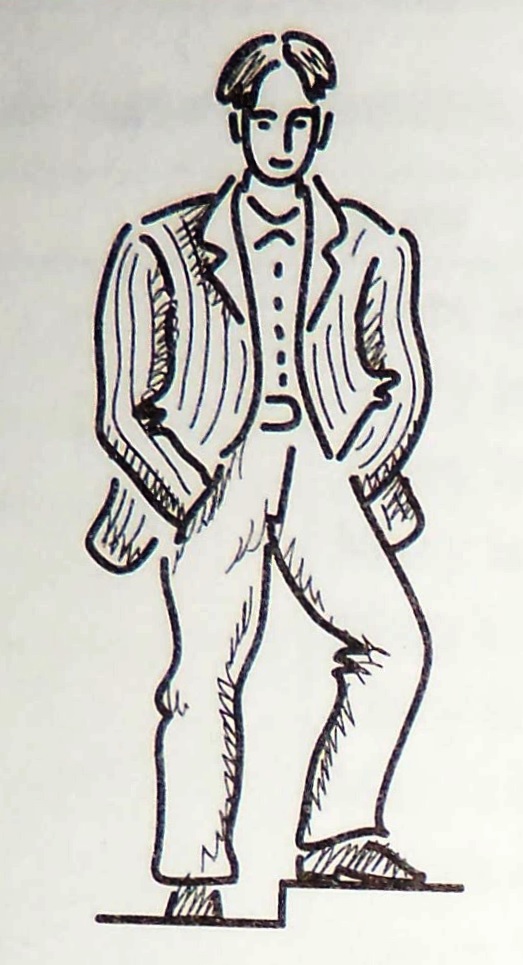
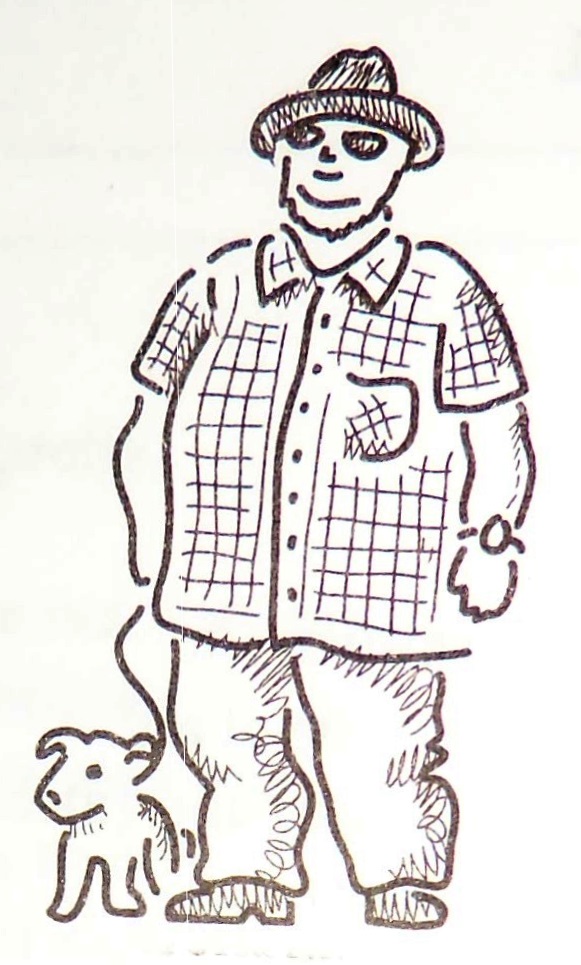
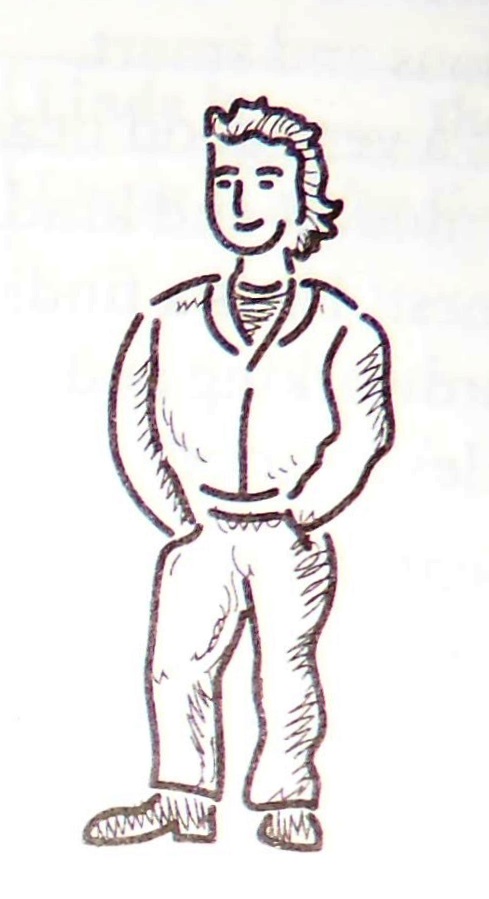
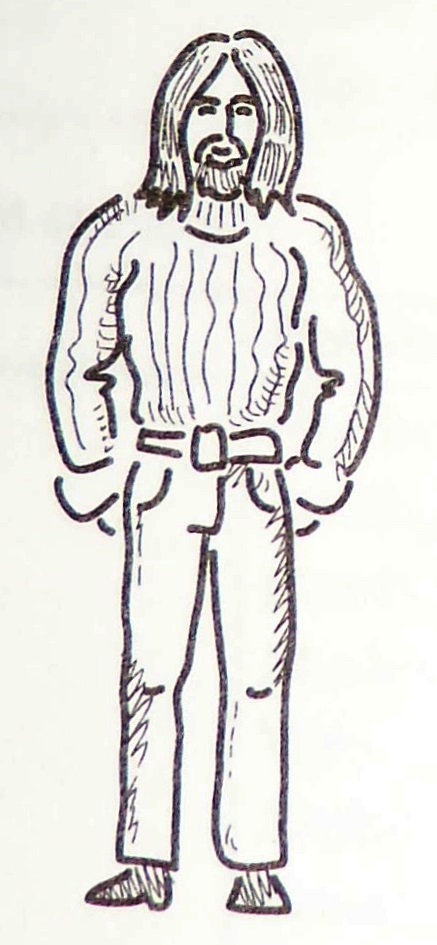
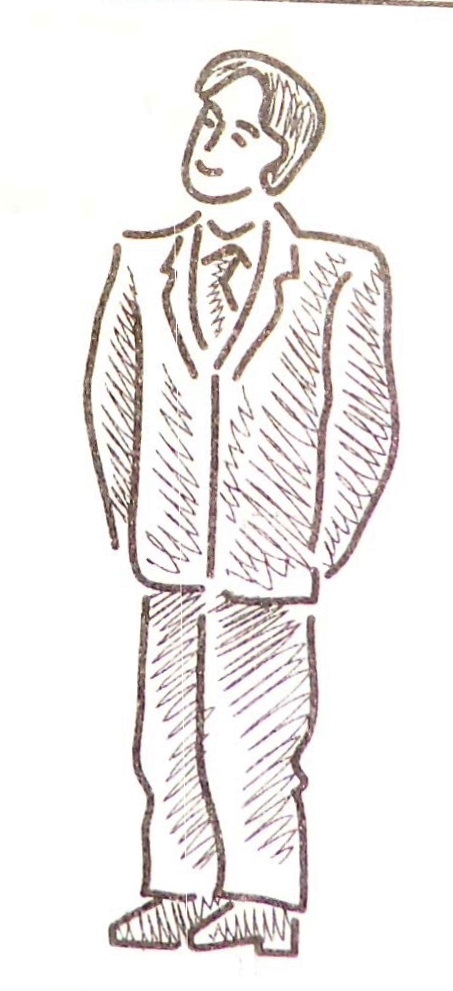
6.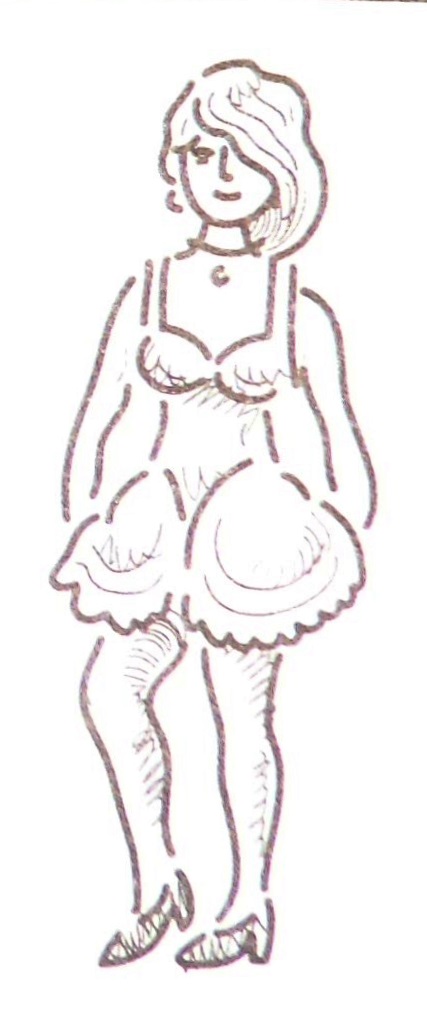
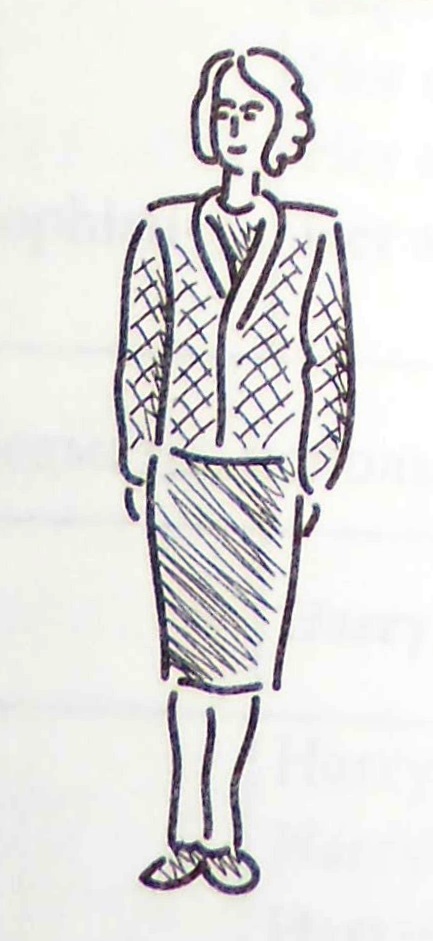
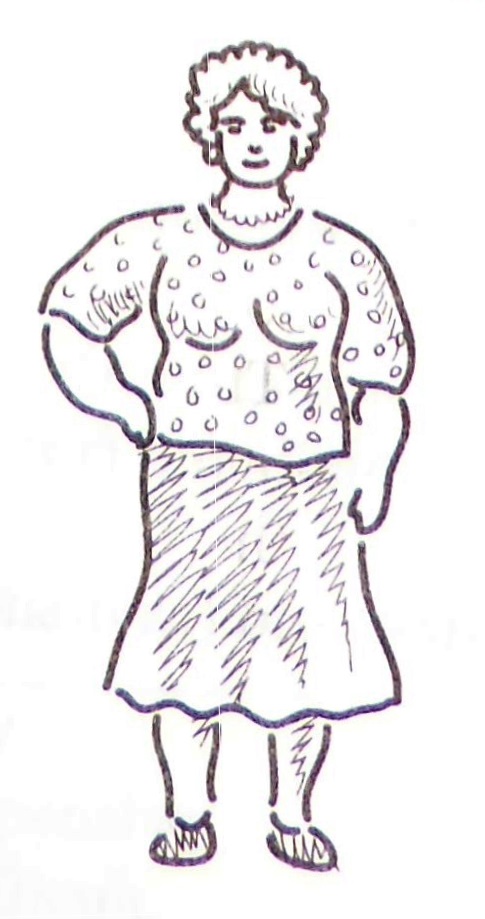
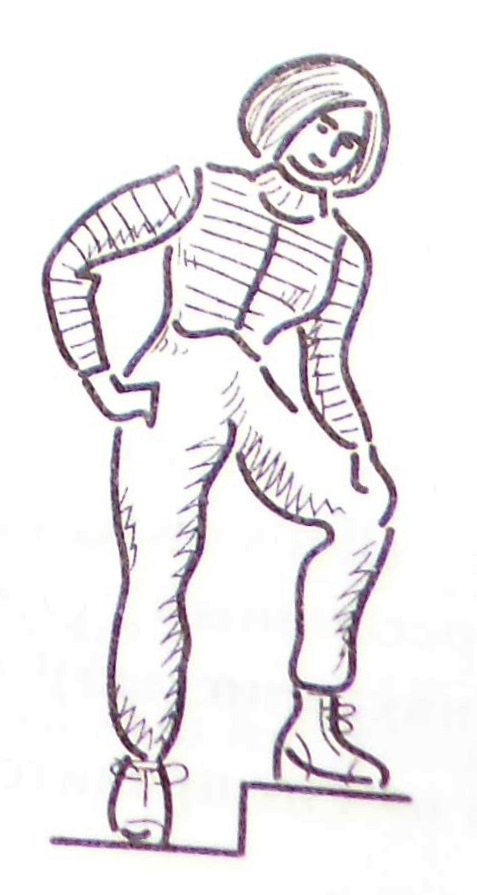
2. Прочтите текст, определите верны ли следующие утверждения:
As you know people from different countries do not look the same. For example, people from Denmark, Norway and Sweden are usually tall. They have got fair hair, blue eyes and a pale skin.
Most people in Italy, Spain and Greece are short. They have got black or dark brown wavy hair, brown eyes and light brown skin.
Most people from Africa have got black curly hair and very dark skin. They have also got dark brown eyes, full lips and a wide, flattish nose.
People from Arab countries have got dark hair and dark brown eyes. They have got dark skin.
a). People from Norway and Sweden have got fair hair, brown eyes and light brown skin.
b). Most people in Italy, Spain and Greece are short and have got dark straight hair and dark brown eyes.
c). People from Africa have got black curly hair and very dark skin.
d). People from Arab countries have got fair hair, blue eyes and a pale skin.
3. Подберите черты характера с противоположным значением.
|
|
4. Напишите текст о себе, выбрав подходящий вариант:
Hi! My name is … I am fifteen (sixteen, seventeen, eighteen). I live in Pugachev.
I am tall (not very tall, short, of middle height). I am thin (not very thin, rather plump). My face is round (square, oval). I have got a fair (dark) skin. I have got a straight (upturned, crooked) nose. I have got large (small) blue (hazel, black, grey) eyes. My hair is black (fair, dark, blond, chestnut), straight (curly) and long (short, not very long). I am (sociable, easy-going, stubborn, reliable) person.
I study at the polytechnic college. I like my future profession and I am going to do my best to become a good cook (welder, tractor driver, car mechanic).
#3 Vocabulary: members of the family, possessive ´s
1. Проанализируйте семейное древо семьи Холли и дополните предложения, используя следующие слова:
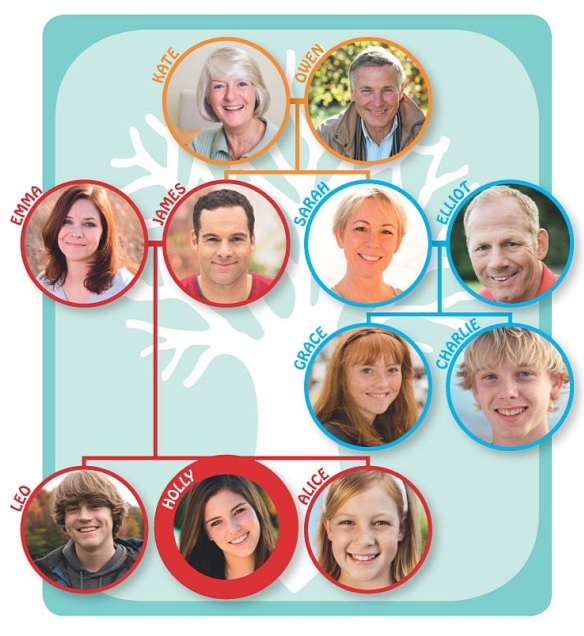
wife — жена
husband — муж
mother, mum — мама
father, dad — папа
son — сын
daughter — дочь
brother — брат
sister — сестра
grandmother — бабушка
grandfather — дедушка
grandson — внук
granddaughter – внучка
aunt — тетя
uncle — дядя
niece — племянница
nephew — племянник
cousin – двоюродный
брат (сестра)
1. James is Holly´s … . 6. Owen is her … .
2. Leo is her … . 7. Sarah is her … .
3. Kate is her … . 8. Charlie is her … .
4. Emma is her … . 9. Elliot is her … .
5. Alice is her … .
2. Укажите родственные связи членов семьи Холли.
1. Leo is Sarah´s … . 9. Sara is Leo´s … .
2. James is Emma´s … . 10. Emma is James´ … .
3. Holly is Kate´s … . 11. Kate is Holly´s … .
4. Grace is Elliot´s … . 12. Elliot is Grace´s … .
5. Kate is Owen´s … . 13. Owen is Kate´s … .
6. James is Kate´s … . 14. Kate is James´ … .
7. Alice is Sarah´s … . 15. Sarah is Alice´s … .
8. Charlie is Owen´s … . 16. Owen is Charlie´s … .
3. Вставьте пропущенные слова.
children – дети
grandchildren — внуки
grandson — внук
granddaughter — внучка
parents – родители
grandparents — бабушка и дедушка
a). son + daughter = ?
b). mother + father = ?
c). grandmother + grandfather = ?
d). grandson + ? = ?
#4 Grammar: present simple Speaking: talking about family, duties about the house
1. Поставьте глаголы в скобках в the Present simple tense.
1. Сhildren (to like) to play computer games. 2. My sister (to read) English and French books. 3. Our cousin (to live) in the village. 4. Their son (to go) to school every day. 5. I (to want) to become a worker. 6. My grandmother (to take) me by the hand. 7. I (to see) my niece on Fridays. 8. My brother´s wife (to teach) Russian at school. 9. Our sister (to live) in the USA. 10. I always (to get) up at 7 o´clock.
2. Составьте предложения из следующих слов. Переведите эти предложения на русский язык.
1. every Monday, at a hospital, my wife, works.
2. watches, her son, TV, often.
3. by car, always, goes, their uncle, to the office.
4. my brother, early, home, usually, comes.
5. to listen to music, in the garden, seldom, your grandfather, likes.
3.
a). Образуйте форму 3-го лица единственного числа the Present simple tense следующих глаголов:
to sit, to read, to skate, to do, to ask, to see, to come, to wash, to teach, to fly, to mix, to play.
б
to y – he / she / it ies
). Распределите их в следующие группы: —s [s], —s [z], —es [iz].
4. Выразите несогласие со следующими утверждениями.
Образец: They get up early. — They don´t get up early.
He speaks French. — He doesn´t speak French.
1. Her children learn English. 2. Tom’s sister lives in a small village. 3. The boys like basketball. 4. He knows my address. 5. The farmers grow potatoes here. 6. Mary teaches at school. 7. We go to the country in summer. 8. I go to the office by bus. 9. They watch TV in the evening. 10. The students of our group study English. 11. Ann and Mary play tennis. 12. My parents like ice-cream. 13. Our granddaughter lives in the USA. 14. I study at the university.
5. Составьте предложения из следующих слов. Переведите их на русский язык.
1. New York, children, live, in, don´t, Tom´s.
2. pizza, brother, eat, doesn´t, my.
3. Lady Gaga, like, my, don´t, friends.
4. their, doesn´t, in, a hotel, uncle.
5. parents, speak, don´t, her, English.
6. Вставьте вместо пропусков do, does, don´t, doesn’t.
a). … your dad work in Abakan? – No, he …
b). … your cousins live near the school? – Yes, they …
c). … your grandfather use computer? – No, he …
d). … her lessons start at 9 o´clock? – Yes, they …
e). … his niece drink coffee? – No, she …
7. 01. Прослушайте три рассказа и соотнесите говорящего с тем, что он рассказал:
a). I like our home to be clean and tidy. I enjoy helping my parents.
b). My duties about the house are to clean the rooms, to wash the dishes after meals, to do the shopping.
c). I have problems with my parents because they don´t like that I don´t clean my room.
Speaker 1
Speaker 2
Speaker 3
8. Заполните пропуски словами: set, wash, clean, wash, cook, broom, make, iron, sweep, rake the leaves, water
1. Every morning I ____ the plants.
2. My father usually ____ the dishes.
3.My mother usually _____ the meal.
4. Jack is a lazy boy. He never _____ in the garden.
5. I always ___ the floor with a mop.
6. I usually _____ the table before meals.
7. My brother sometimes _____ the window.
8. Tom always helps at home. He usually ______ his bed in the morning.
9. I usually sweep the floor with a ______.
10. My sister ______ the laundry.
11. I always _____ the floor at home.
9
-
clean
-
water
-
mop
-
vacuum
-
sweep
-
take out
-
dust
-
do (x2)
-
cook
-
make
-
wash
-
the floor (x2)
-
the furniture
-
the windows
-
the bed
-
the room
-
the rubbish
-
the ironing
-
the carpet
-
the plants
-
dinner
-
the shopping
. Подберите пару
10. Изучите список домашних обязанностей и соотнесите картинки с нужным номером:
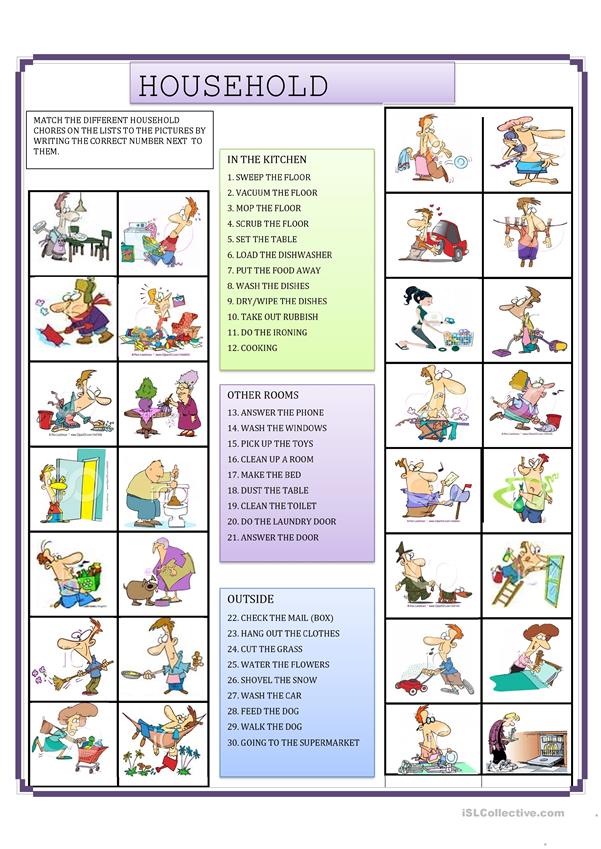
11. Выберите правильную подпись к картинке.
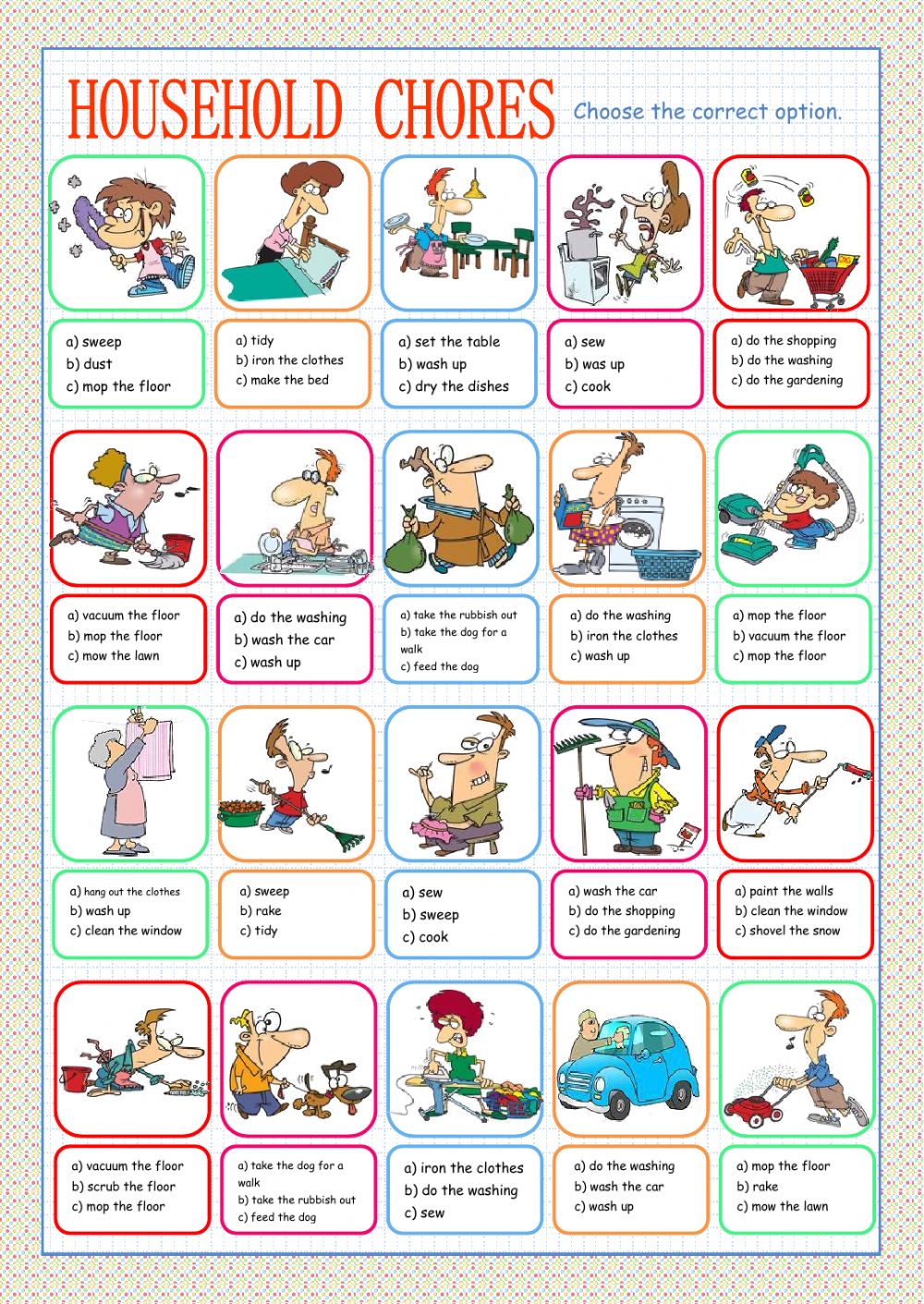
#5 Vocabulary: the house, prepositions of place. Grammar: there is/there are. Listening: dialogue to describe the house.
Speaking: the house
1. Найдите данные слова на рисунке и переведите их на русский язык.
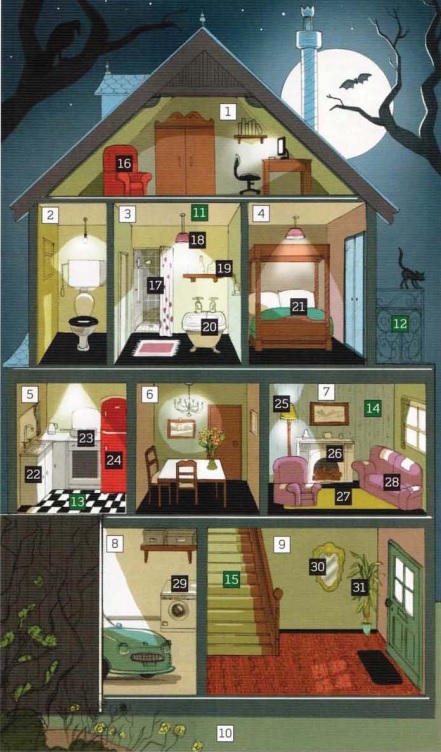
A. ROOMS (#1-10)
a bathroom
a bedroom
a dining room
a garage
a garden
a hall
a kitchen
a living room
a study / an office
a toilet
a celler/ a basement
an attic / a loft
a roof
B. PARTS OF A ROOM (#11-15)
a balcony
the ceiling
the floor
the stairs
the wall
the door
the corner
the window
C. THINGS IN A ROOM (#16-31)
an armchair
a bath
a bed
a carpet
a cooker
a cupboard
a fireplace
a fridge
a lamp
a light
a mirror
a plant
a shelf (shelves)
a shower
a sofa
a washing machine
REMEMBER!
the stairs
upstairs
downstairs
the FIRST FLOOR in Russia = the GROUND FLOOR in the UK.
2. a). Заполните таблицу, используя данные выражения.
|
Room |
W a). have a shower, b). cook dinner,
c). watch television, d). sit outside, e). sleep in the bed, f). read newspapers, g). drink a cup of tea, h). take a bath, i). put on clothes, j). grow flowers hat we do |
|
a kitchen |
|
|
a living room |
|
|
a bedroom |
|
|
a bathroom |
|
|
the garden |
б). Расскажите о том, что вы и члены вашей семьи делают в указанных помещениях. Используйте слова: always, usually, often, sometimes.
3. Выберите правильный вариант, переведите на русский язык.
1. There is / There are a bath in the bathroom. 2. There is / There are posters in my bedroom. 3. There isn´t / There aren´t a fireplace in our dining room. 4. There are / There aren´t any plants in my brother´s house. 5. There isn´t / There aren´t a computer in the hall. 6. There is / There are a fridge in the kitchen.
4. Дополните диалог подходящими формами оборота there is / there are и, если необходимо, any.
— Hello. I´m interested in the flat to rent.
— Oh, OK. Let me tell you about it. (1) … a large living room and (2) … a small kitchen.
— (3) … a table in the kitchen?
— No, (4) … . But (5) … a very nice dining room with a table and some chairs.
— That´s fine. What about the bedrooms? How many bedrooms (6) … ?
— (7) … three bedrooms and a bathroom.
— (8) … a shower in the bathroom?
— Yes, (9) …
— Good. (10) … bookshelves in the living room?
— No, I´m sorry. But (11) … some cupboards.
— That´s OK. I think it´s perfect for us. How much is it?
5. Составьте предложения, используя предлоги места.
There is a ghost …

… behind… … in … … under …

… over … … in front of … …next to …

…between… … opposite … … on …
6. Закончите описание комнаты Тома.
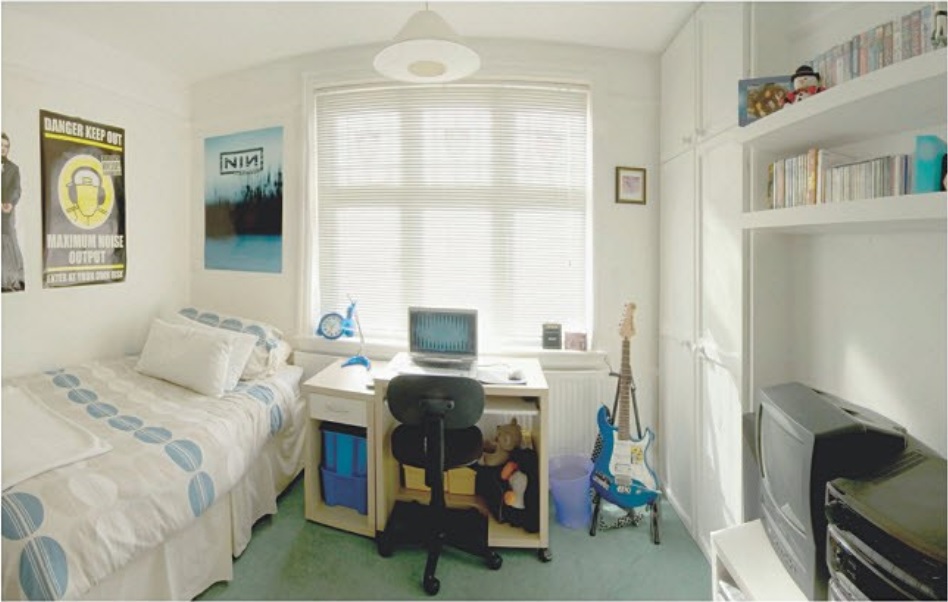
This is Tom´s room. It´s large and light. There is a bed … . There is a desk … . Tom´s computer is … . There is the lamp … . There are some shelves with books … . There is a small TV … . Tom´s wardrobe is … . There are some posters … . There isn´t any carpet … . Tom´s guitar is … . There aren´t any plants … because Tom doesn´t like them.
7. Опишите свой дом (квартиру), дополнив предложения.
My family is … (large, small). We all live in our … (house, flat). Each of us has his favorite place. My father’s favorite room is … (the living room). There are … (a flat-screen TV, a wall unit, a sofa, two armchairs) in our … . He usually … (watches TV, reads newspapers) there. My mother’s favorite place is our … (kitchen). She … (cooks there my favorite dishes, likes to sit with a cup of coffee). My favorite place is my … (bedroom). It isn´t large, but … (cosy, light, and stylish). The wall colour is … (light, dark). The furniture there is … (modern, stylish). There is … (a bed, a desk, a wardrobe) in my bedroom. I like … (to listen to music, to play computer games) there.
8. 05. Луиза и Эрик прибыли на выходные в Шотландию и остановились в гостинице. Прослушайте диалог и укажите какие вещи имеются в гостинице, а какие отсутствуют:
□ a lift □ TV □ Wi-Fi □ a restaurant □ a bar □ a great view
living-room
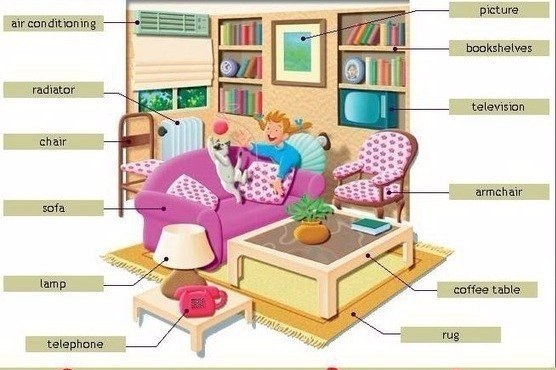
painting
carpet
bookcase
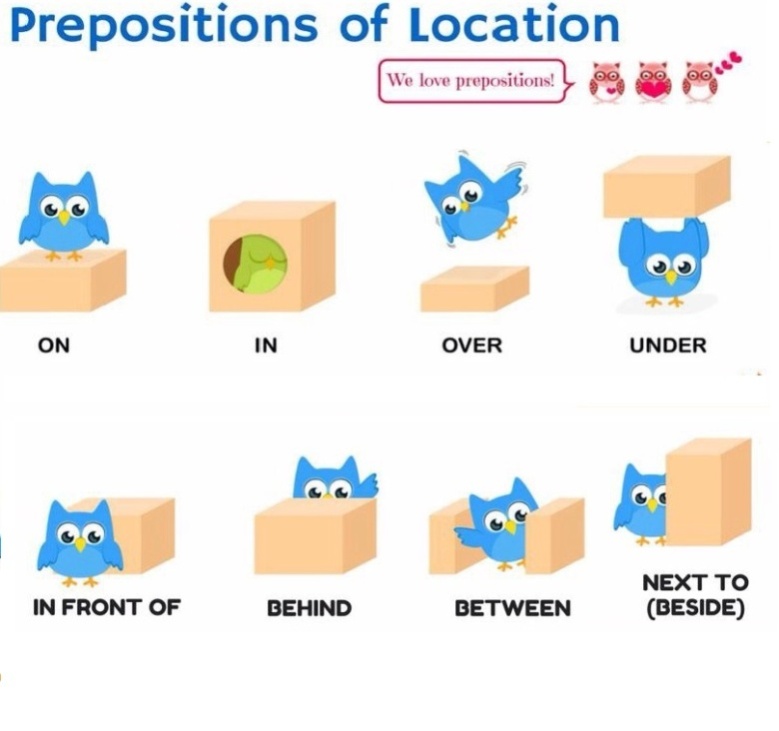
window – окно
wall – стена
floor – пол
ceiling – потолок
corner – угол
bedroom
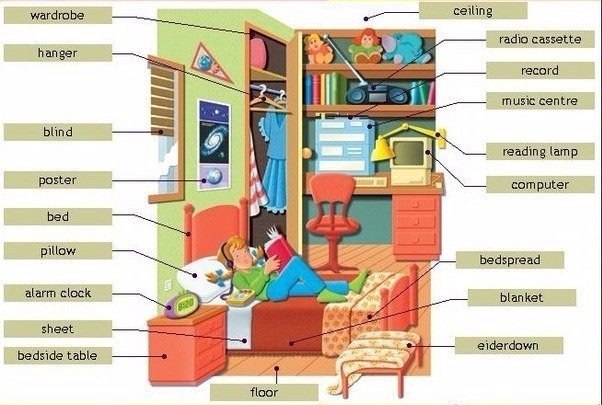
desk
chair

window – окно
wall – стена
floor – пол
ceiling – потолок
corner – угол
9. 04. Семейная пара подыскивает дом для проживания. Прослушайте их диалог с хозяйкой дома. Вставьте пропущенные слова.
Kim: The garden is wonderful, I love it.
Leo: Is there a garage?
Barbara: Oh, yes, there´s a big garage over there. Let´s go inside the house. … This is the (1) _______ . There are five rooms on this floor, the kitchen, the (2) __________, the living room, the (3) _________, the library…
Leo: Wow! There´s a library, Kim!
Barbara: This is the living room.
Kim: I love the furniture, the old sofa, the armchairs, (4) __________.
Barbara: And this is the (5) __________ . It´s very big, as you can see.
Kim: Is there a dishwasher?
Barbara: No, it isn´t. It´s an old house, you see.
Leo: Never mind. I think it´s lovely. Is there a (6) ___________ downstairs?
Barbara: Yes, there´s one downstairs and there are three upstairs.
Kim: Are there any neighbours with children?
Barbara: No, there aren´t any neighbours near here. But there are some families with children in the village.
Kim: That´s great. You lived in this house, is that right, Mrs…?
Barbara: Call me Barbara, dear. Yes, I lived here. A long time ago. Now I live in the village. Let´s go upstairs.
#8 Vocabulary & listening: numerals, the dates,
telling the time, prepositions of time
1. 06. Прослушайте названия числительных, укажите в них ударные слоги.
1. a). 13 b). 30; 2. a). 14 b). 40; 3. a). 15 b). 50; 4. a). 16 b). 60;
5. a). 17 b). 70; 6. a). 18 b). 80; 7. a). 19 b). 90.
2. Запишите числительные словами.
a). Количественные числительные:
3, 5, 11, 12, 13, 24, 69, 325, 1005, 530425.
б). Порядковые числительные:
1, 2, 15, 23, 84, 149, 150, 208, 1000, 2000000.
3. 07. Прослушайте даты и запишите их.
___ January, ___ February, ___ March, ___ April, ____May, ___ June, ___July, ___ August, ___ September, ___ October, ___ November, ___ December.
4. Запишите цифрами следующие даты.
a). the first of March nineteen seventy-six; b). the fifth of December two thousand; с). the sixteenth of May nineteen o five; d). the third of July nineteen hundred.
5. Переведите на английский язык.
1). 7 марта 1999 года. 2). 1 сентября 1977 года. 3). 20 апреля 1911 года. 4). 12 марта 1950 года. 5). 12 декабря 2024 года.
6. Решите примеры и запишите ответы словами.
a). sixty-two — fourteen = …
b). fifteen + two hundred and forty-six = …
c). ninety + ten = …
d). thirty-one + nineteen = …
e). seventy-three + eighty-two = …
f). three thousand one hundred and twelve — ninety-nine = …
7. Вставьте пропущенные предлоги.
1. My dad´s birthday is … 3rd April. 2. I like watching TV … evening. 3. Her brother Alex does his morning exercises … the mornings. 4. Our niece was born … 1995. 5. The party is … Sunday. 6. `Mary and Lora often play volleyball … Monday morning. 7. We arrive home late … night. 8. This year the Christmas is celebrated … Wednesday the 7th of January. 9. They don´t watch TV … afternoon. 10. … 2011 Prince William married Catherine Middleton.
8. Запомните слова, использующиеся для обозначения времени.
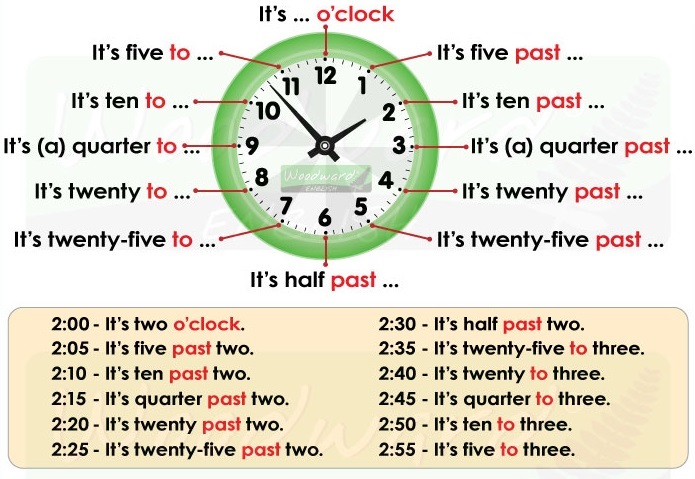
9. Укажите который сейчас час.
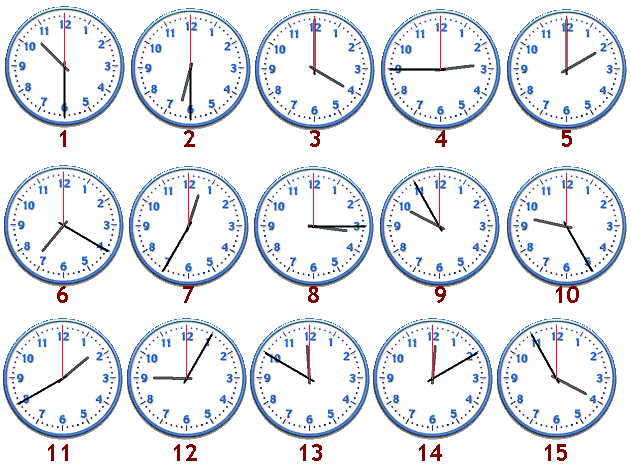
#9 Vocabulary & listening: everyday activities
Grammar: adverbs of frequency
Writing: my working day
1. а). Опишите типичный день Лизы, используя следующие выражения:

to get up early
to have breakfast
to have a shower
to go to work by bus (by car)
to start work

to have lunch
to finish work
to go home
to go shopping
to go to the gym

to make dinner
to have dinner
to do housework
to watch TV
to have
a bath
to go to bed
late
б). В какое время вы делаете указанные действия?
2. Как часто вы делаете указанные действия? Используйте always, usually, often, sometimes, never.
—
100%
always
listen to the radio in the car,
— read newspapers in the morning,
—
usually
speak English outside class,
— watch TV in the evening,
—
often
50%
have pasta for lunch,
— clean the rooms at the weekend.
—
sometimes
eat fast food,
— drink cola,
—
0%
never
play computer games,
— do my home work.
3. 08. Прослушайте рассказ Лиэма о том, как он проводит свой субботний день. Выберите верный вариант.
a). Liam usually gets up early / late in the morning.
b). Liam never / always has breakfast.
c). In the afternoon Liam usually / often go out with his friends.
d). In the evening Liam often / sometimes watches sports on TV with his dad.
e). Liam is never / usually tired at 10 o´clock.
f). Liam is sometimes / always in bed before midnight.
4. Познакомьтесь с распорядком дня Майка. Используя текст как образец, составьте рассказ о вашем распорядке дня.
Mike is a first year student of the Technical College. He goes to the College every day except Sunday. Mike’s classes begin at 8.00. He lives far from the College, so he must get up very early. The alarm clock wakes him up at 6.30 a.m. Sometimes he turns off the alarm and lies in bed until his mother wakes him up again.
He jumps out of bed, opens the window, does his morning exercises to the music, makes the bed and goes to the bathroom. In the bathroom he always takes a cold or a warm shower and cleans his teeth. Then he goes back to his room and gets dressed.
In some minutes he is ready for breakfast. He usually has a cup of tea or coffee and a sandwich or two. Mike is always in a hurry because he doesn’t want to be late for classes. At 7.30 he leaves home for the College. He usually gets to the College by bus. It takes him about half an hour to get to the College.
He comes to the College some minutes before the bell rings. Mike has enough time to get everything ready for his classes. His days are not like each other because he has a different timetable every day. As a rule he has 6 lessons a day. Mike does his best not to miss classes because he knows that missing classes is a sure way to fail at exams. At 11.10 o’clock he has a break for lunch. Mike goes to the canteen. After the break classes go on. They are usually over at about 3 o’clock.
After classes Mike usually goes home. After a day of hard work Mike feels very tired and he hurries home. At home he has dinner and a short rest, then he does his homework and helps his mother about the house. In the evening Mike watches a serial or a detective story on TV. Sometimes he goes out with his friends. Mike goes in for sports. Twice a week he plays volleyball in the College gym. He returns home at 8 p.m. and has supper. At about 12 o’clock Mike goes to bed.
#10 Vocabulary, listening & speaking: free-time activities
Grammar: love, like, hate +Ving
1. Соотнесите название хобби с фотографией.






a). camping
b). buying clothes
c). cooking
d). cycling
e). flying
f). going to the cinema
g). reading
h). running
i). swimming
j). painting
k). travelling
l). watching DVDs
2. Прочтите анкеты 6 человек с сайта знакомств. Сможете ли вы подобрать пары? Объясните ваш выбор.






Образец: Isabella and … , because she loves … and he likes …
3. Образуйте глагольные формы с –ing окончанием следующих слов, заполните таблицу.
cycle, drive, listen, make, park, play, run, shop, serf,
study, swim, travel, write, draw, knit, sew, cook, ride, fish
|
+ ing |
e |
согласная*2 + —ing |
4. Переведите предложения на английский язык.
1. Моя сестра любит танцевать. 2. Моему отцу не нравится ездить на работу на машине. 3. Мой друг увлекается бегом. 4. Ей не нравится делать покупки по выходным. 5. Я люблю готовить ужин для всей семьи. 6. Их бабушка любит вязать и шить. 7. Его родители увлекаются рисованием. 8. Вам нравится рыбачить зимой? 9. После занятий я люблю работать в интернете. 10. Нам не нравится учиться в субботу.
5. 09. Арчи и Шарлот встречаются в кафе. Прослушайте их беседу и укажите, верны ли следующие утверждения:
1. ___ Charlotte and Archie drink green tea.
2. ___ Archie is a student.
3. ___ They love walking.
4. ___ They don´t like camping.
5. ___ They like eating fast food.
6. ___ They don´t like Japanese food.
6. Прочтите текст. Разделяете ли вы описанные увлечения? Расскажите, что вы любите делать в свободное время.
Hobby is a special interest that people do in their free time. Everybody has his/her own hobby.
I like to listen to music. Now I have got a compact disc player, my parents´ gift, and I collect compact discs. I like different music, it only should be good. I collect discs of my favourite groups and singers. I carefully study the information printed on disc booklets. I try to find everything about my favourite singers. Also I like to watch music programmes on TV. I want to keep up with the news in the world of music.
Of course, I like to spend my spare time with my friends. We talk about all sorts of things (teachers, girls). We discuss films, books, TV programmes. If the weather is fine, we like to be in the open air. We find a nice place somewhere in the forest. We make a fire, bake potatoes and have a lot of fun. When the weather is bad, my friends come to my place. We have a good time together.
#11 Vocabulary: post address, places in town
Grammar: wh-questions
Listening: giving directions
1. Найдите слова, показанные на картинках.


|
l |
e |
t |
t |
e |
r |
b |
o |
x |
|
s |
n |
a |
b |
s |
d |
e |
f |
p |
|
t |
v |
f |
p |
a |
p |
e |
r |
o |
|
a |
e |
a |
d |
d |
r |
e |
s |
s |
|
m |
l |
e |
t |
t |
e |
r |
l |
t |
|
p |
o |
s |
t |
c |
a |
r |
d |
m |
|
h |
p |
o |
s |
t |
e |
r |
k |
a |
|
j |
e |
i |
y |
w |
d |
d |
e |
n |
2. a). Познакомьтесь с правилами написания зарубежных почтовых адресов.

б). Напишите собственный почтовый адрес.
3. Вы знакомитесь с новым другом (подругой) по Интернету. Используя данные слова, запишите вопросы, которые вы ему (ей) зададите.
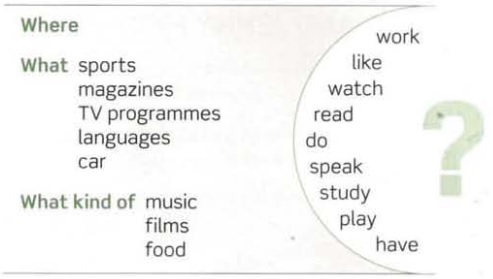

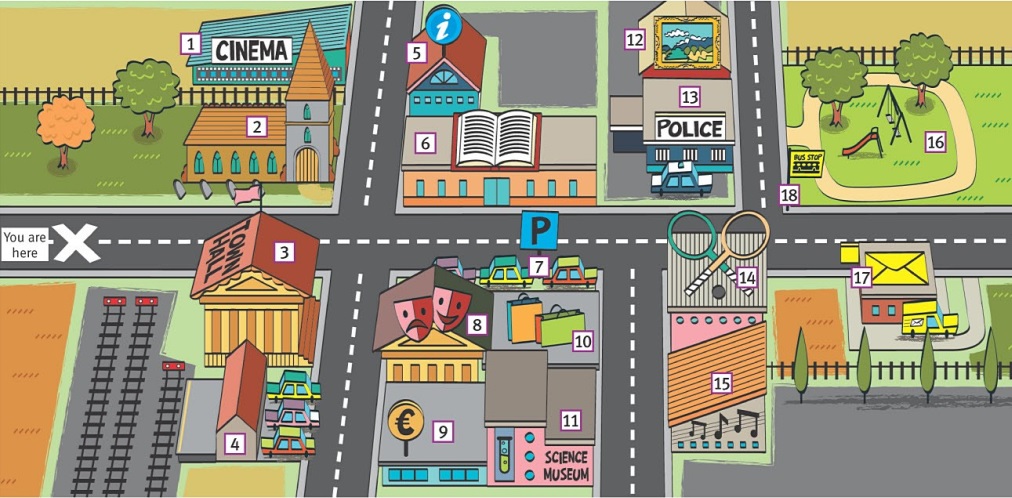
4. Соотнесите следующие слова с местами, обозначенными на карте.
art gallery bank bus stop car park church cinema concert hall leisure centre library museum park police station post office shopping center theatre tourist information centre town hall train station
5. 10. Определите о каких местах в городе идет речь.
1. ______ 2. ______ 3. ______ 4. ______ 5. ______ 6. ______
7. ______ 8. ______ 9. ______ 10. _____ 11. _____ 12. _____
6. Соотнесите указания направления с изображениями.

a). go straight on
b). take the first left
c). take the second right
d). go past the church
7. 11. Прослушайте диалоги. Используя карту выше, следуйте приведенным в них инструкциям (стартовая точка «You are here»). Укажите конечный пункт назначения.
1. _________ 2. _________ 3. _________ 4. _________ 5. _________
#12 Vocabulary: food, shops
Grammar: quantity: countable and uncountable nouns, some/any
Listening: dialogues in shop
1. а). Соотнесите указанные слова с изображениями.
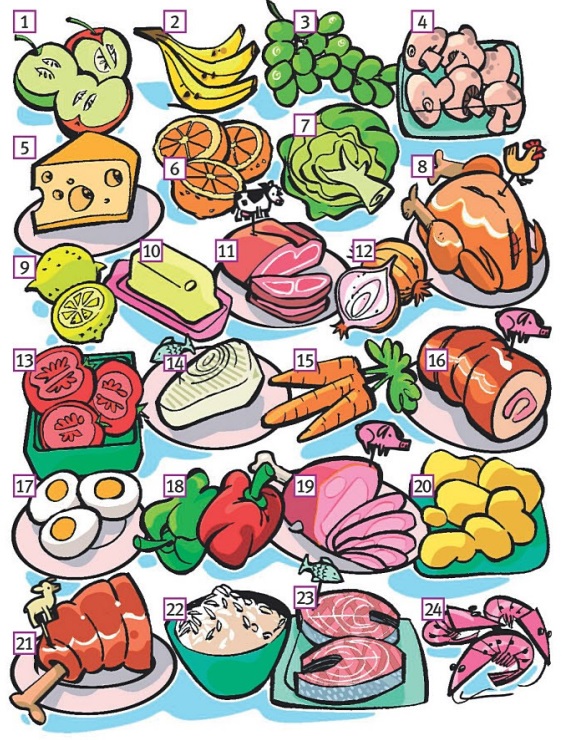
apples bananas beef butter cabbage carrots cheese chicken eggs grapes ham lamb lemons mushrooms onions oranges peppers pork potatoes prawns rice salmon tomatoes tuna
б). Сгруппируйте товары из части а) по видам магазинов, в которых их можно купить.
2. Образуйте словосочетания и переведите их на русский язык.
a loaf cheese
a bottle toothpaste
a slice soup
a liter sardines
a glass bread
a bar of lemonade
a jar meat
a kilo wine
a tube soap
a tin orange jam
a plate chocolate
3. Выберите правильный вариант, обращая внимание на правильное использование исчисляемых и неисчисляемых существительных.
1. Alex has got much information / informations about our travel. 2. Their sister wants to buy new furniture / furnitures. 3. Your hair / hairs is fair. 4. My granny always gives me some advice / advices. 5. It´s healthy to drink fresh water / waters. 6. Her dad doesn´t buy new sunglass / sunglasses.
4. Вставьте some или any.
1. There are … students in the library. 2. There isn’t … light in the room. 3. Mary has got two sisters but she hasn’t got … brothers. 4. I don’t like popular music but … people like it. 5. Has mother … meat for dinner? – Yes, she has … . 6. Are there … mistakes in Nick’s dictation? – No, there are not … . 7. Has Max … friends here? – Yes, he has … . 8. Has Bess … interesting books to read? – No, she hasn’t … . 9. Would you like … coffee? 10. Can I have … tea, please?
5. 11. Прослушайте диалоги и ответьте на три вопроса о каждом покупателе:
a). Which department the customer in?
b). What does the customer want to buy?
c). Has the shop got what the customer wants?
#13 Vocabulary: sports
Grammar: comparative adjectives, superlative adjectives;
comparison of adjectives
1. а). Найдите соответствия.
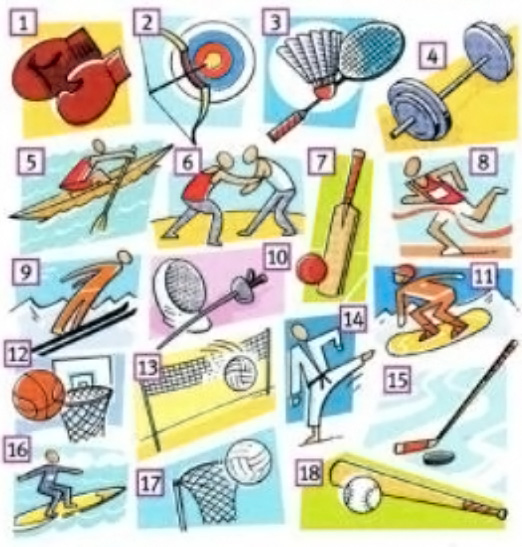
a). archery
b). athletics
c). badminton
d). baseball
e). basketball
f). boxing
g). cricket
h). fencing
i). ice hockey
j). karate
k). netball
l). rowing
m). ski jumping
n). snowboarding
o). surfing
p). volleyball
q). wrestling
r). weightlifting
б). Распределите виды спорта из части а) в следующие группы (некоторые виды спорта могут быть отнесены к разным группам):
— winter sports, — combat sports, — team sports,
— indoor sports, — outdoor sports
2. Назовите представленные на пиктограммах виды спорта.

a). b). c).

d). e). f).

g). h). j).
3. Выберите правильный вариант степени сравнения прилагательного. Переведите предложения на русский язык.
1. Nick is (happier, the happiest) boy that I know. 2. Of the six cars, I like the silver one (better, best). 3. Jane’s notebook is (cheaper, the cheapest) than mine. 4. This is (more delicious, the most delicious) cheese-cake I have ever had! 5. This bookcase is (more beautiful, the most beautiful) than that one. 6. Do you feel (better, the best) today than yesterday? 7. I think my cat is (prettier, the prettiest) of all the cats in the world. 8. Steve Jobs is (more famous, famouser) than Stephen Wozniak. 9. This week the weather is (hotter, more hot) than last week. 10. Our new house is (more expensive, expensiver) than the old one.
4
Ewan is taller than Ryan.
Ryan is shorter than Harry.
Harry is taller than Evan.
Lewis is shorter than Evan.
Jack is shorter than Ryan.
Lewis is taller than Ryan.
5. Подберите каждому предложению подходящие по смыслу фразы с прилагательными.
аs slow as a turtle (медленный как черепаха) – as pretty as a rose (красивый как роза) – as high as a mountain (высокий как гора) – as white as snow (белый как снег) – as hot as fire (горячий как огонь) – as pale as the moon (бледный как луна) – as brave as a lion (отважный как лев) — as clear as a bell (чистый как колокольчик) – as blue as the sky (синий как небо) – as busy as a bee (занятой как пчела) – as clumsy as a bear (неуклюжий как медведь) – as strong as steel (крепкий как сталь) – as light as a feather (легкий как пушинка) – as free as a bird (свободный как птица) – as true as a dog (верный как пес) – as cold as ice (холодный как лед)
1. My friends are … 2. Those buildings are … 3. Her voice is … 4. She has got 5 children and she is always … 5. You look ill, your face is … 6. Put on your coat. Your hands are … 7. Her teeth are … 8. Bob is a real man. He is … and his character is … 9. Their daughter looks like an angel, she is … 10. What colour are her eyes? – They are … 11. You have broken my chair. You are … 12. I can’t stand on the sand. It’s … 13. When I am in love I feel … 14. At the top of the mountain I started feeling …
#14 Vocabulary: sports
Grammar: comparative adjectives,
superlative adjectives
Listening: sports commentaries
1. Составьте из данных слов предложения, переведите их на русский язык.
a). most – the Mona Lisa – in – is – painting – the – famous – the – world.
b). longer – the Don – is – the Volga – than.
c). more – Spain – Germany – than – beautiful — is.
d). London – city – in – biggest – the – England – is.
e). the – team – Adam – is — worst – the – player – in.
2. Соотнесите название игры с текстом.
— football — baseball — basketball — cricket — chess
1. It is a game of two players. Each of then starts with sixteen different playing pieces to move on the board. The aim is to move your pieces so that your opponent’s king will be taken.
2. This game is played on a court with a large orange ball. There are five players in each team. Two teams try to score goals by throwing a ball through a net fixed to a metal ring at each end of court. The players bounce the ball while running, and pass it to each other. The team with the most points wins.
3. It is a game between two teams and is played on a field with a bat and a small white ball. Each team consists of nine players. The teams take turns playing in the field and batting the ball. The game has nine innings.
4. It is a game played between two teams of eleven players. Players kick a ball around a field trying to score a goal. The team with the most points wins. This game is very popular in Russia and all over the world.
5. It is sometimes called an English national game. It is known that people played it in England as early as 1550. It is a very long game. International matches last for 5 days. This game is not played only by men; girls and women play it too.
3. 13. Прослушайте диалог между Эми и Алексом.
a). О каких видах спорта идет речь в разговоре?
— volleyball — American football — swimming — tennis — basketball
— football (soccer) — rollerblading — gymnastics
b). Отметьте следующие суждения как верные или неверные.
1. Amy goes rollerblading every day.
2. Alex likes playing tennis, but he doesn´t like watching it on TV.
3. Amy likes watching American football games.
4. Alex plays football in his school team.
4. 14. Прослушайте фрагменты спортивных репортажей и соотнесите их с изображением. Определите, о каких видах спорта идет речь.
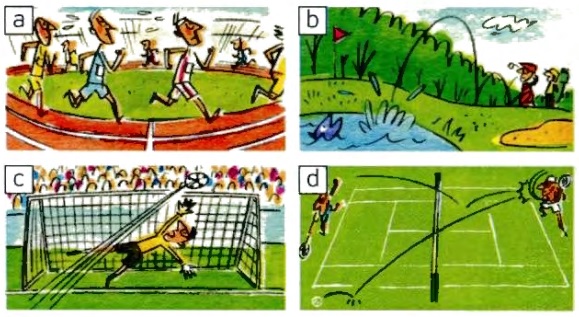
1. ___________ 2. ___________ 3. __________ 4. ___________
5. Раскройте скобки, употребляя нужную форму прилагательного.
1. Her eyes are (grey) than mine. 2. He is (fat) man in the village. 3. My sister is (tall) girl in our class. 4. Who is (attentive) in your group? 5. It is autumn. Every day the air becomes (cold), the leaves (yellow). 6. Oil is (light) than water. 7. The (tall) trees in the world grow in California. 8. This is (beautiful) view I have ever seen in my life. 9. The Volga is (short) than Mississippi. 10. Which building is (high) in Moscow? 11. She speaks Italian (good) than French. 12. January is (cold) month of the year.
6. Вставьте as… as… или so… as… .
1. Mike is … tall … Pete. 2. Kate is not … nice … Ann. 3. My room is … light … this one. 4. Sergei is … old … Mike. 5. She is … young … Tom´s brother. 6. Nick´s English is not … good … his friend´s. 7. I am not … tall … Pete. 8. Alex is … lazy … his brother. 9. This child is not … small … that one. 10. A football match isn´t … exciting … a hockey match.
#15 Vocabulary: transport
Grammar: present continuous
1. а). Найдите соответствия.
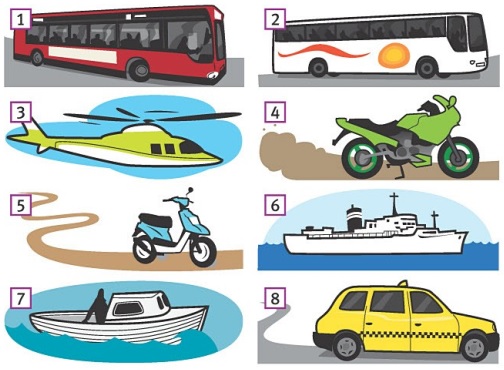
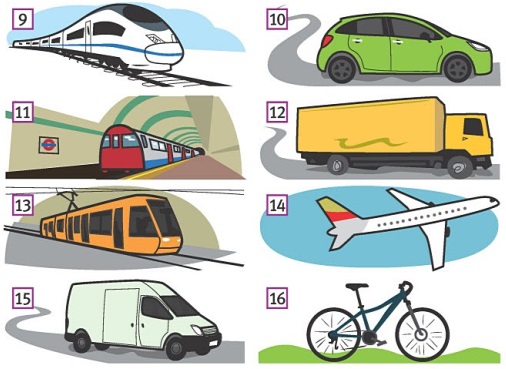
bike boat bus car coach helicopter lorry motorbike plane
scooter ship taxi train tram underground train van
b). Распределите виды транспорта из части а) в следующие группы: — land, — air, — sea.
2. Перефразируйте следующие предложения таким образом, чтобы остался тот же самый смысл.
go by bike = cycle
go by car = drive
go by bus, train, taxi, plane = take (catch) bus, train, taxi, plane
go on foot = walk
give somebody a lift to… = drive somebody to…
1. Dad sometimes drives to work.
Dad sometimes … to work … .
2. My brother drives me to the underground station.
My brother … me … to the underground station.
3. Michelle never goes to college by bike.
Michelle never … to college.
4. On Mondays, Harry takes the tram to college.
On Mondays, Harry … to college … .
5. Do you go to the beach on foot?
Do you … to the beach?
6. We always walk on town.
We always … on town … .
7. My Mum usually goes to London by car.
My Mum usually … to London.
3. 15. Прослушайте звуки и расставьте их в правильном порядке:
□ babies are crying
□ dogs are barking
□ people are talking loudly or arguing a lot
□ people are having noisy parties
□ children are shouting all the time
□ people are having the TV on very loud
□ people are playing loud music
□ people are playing musical instruments
4. а). Посмотрите рисунок многоквартирного дома. Как вы думаете: по какой причине жильцы из квартиры №5 не могут уснуть?
б). 16. Прослушайте диалог и проверьте верны ли были ваши суждения.
в). Прослушайте диалог еще раз и дополните предложения, используя слова из списка:
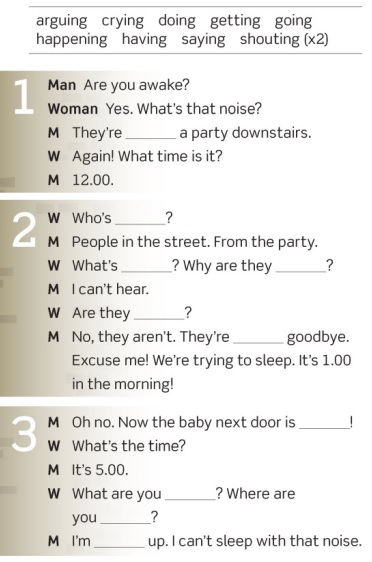
#16 Grammar: present continuous,
present continuous & present simple
Listening: holidays plans
1. Образуйте формы глаголов с окончанием –ing, распределите их по группам:
|
+ ing |
e |
согласная*2 + —ing |
have, come, listen, buy, swim, put, use, stop, drive, win, cry, travel, go
2. Составьте из слов предложения.
a). Anna – juice – is – orange – drinking.
b). not – sun – shining – the – is.
c). are – parents – the – in – my – sitting – garden.
d). dress – she – long – is – a – today – wearing.
e). we – playing – not – violin – are – the.
3. Запишите утвердительные (+), отрицательные (-), вопросительные (?) предложения, используя the present continuous.
1. George/drive very fast. (+) 2. I/learn Russian. (-) 3. It/snow. (?) 4. They/walk in the park. (+) 5. Sophie/eat berries. (-) 6. Mother/vacuum-clean. (?) 7. Jenny/write a postcard. (+) 8.We/swim in the swimming-pool. (-) 9. I/listen to music. (+) 10. Kevin/work. (?) 11. The nurse/feed the patient. (+) 12. The wind/blow. (?) 13. She/sing a song. (-) 14. The boys/ride horses. (?) 15. They/build a new house. (-)
4. 17. Джек и его подруга Ингрид совершают поездку на лондонском колесе обозрения.
a). Прослушайте их диалог и отметьте места, которые они видят.
□ Trafalgar Square □ Big Ben □ Saint Paul´s Cathedral
□ Buckingham Palace □ Westminster Abbey □ The Houses of Parliament
б). Прослушайте диалог еще раз. Дополните его, употребляя глаголы в скобках в форме the present continuous или the present simple.
I Come on, let´s stand over there.
J It … (move). We … (go) up. Look, that´s the Saint Paul´s Cathedral.
I Where? Oh yes, I can see it. Is that Buckingham Palace?
J Yes, and the Queen´s at home.
I How do you know?
J Because the flag … (fly). It only … (fly) when she´s at home.
I I think it … (start) to rain. Oh, yes. Look, it … (rain).
J It always … (rain) when we´re sightseeing!
I We … (go) down now. I … (love) the view of the river with Big Ben and the Houses of Parliament.
J Me too. Go and stand there. I … (want) to take a photo.
I Quick, the door … (open). Let´s go.
5. Выберите верную форму глагола.
1. He … (works/is working) for a big insurance company. 2. Water always … (boils/is boiling) at 100 degrees. 3. I … (wait/am waiting) for my doctor at the moment. 4. Bob, stop! You … (eat/are eating) too fast. 5. She … (has/is having) four brothers. 6. Switch off the radio, please. You … (don’t listen/aren’t listening) to it. 7. I know my bad habit: I often … (talk/am talking) too loudly. 8. Look at the picture. An elegant lady … (rides/is riding) a horse. 9. Give me some salt, please. I … (make/am making) seafood salad. 10. Mary never … (speaks/is speaking) to strange people.
6. 18. Кейт и ее брат Грег просматривают интернет, планируя семейный отпуск. Пронумеруйте следующие виды отдыха в том порядке, в котором они упоминаются в диалоге.
□ Stay on a farm on the Aran Islands □ Elegant hotels in Dublin
□ Canal boat holidays in Ireland □ Hiking in Ireland □ Go horse-riding
7. 19. Прослушайте разговор Кейт со своей подругой Мэгги о планах на отпуск. Дополните диалог.
Maggy: Hey, Kate! How was your weekend?
Kate: My brother and I planned the family summer holiday.
Maggy: Excellent! Where are you going?
Kate: We´re (1) … to Ireland in August.
Maggy: Oh! How are you (2) … there?
Kate: We´re (3) … by ferry. And we´re (4) … a week on a canal boat on the River Shannon.
Maggy: Great! Are you only (5) … a week in Ireland?
Kate: No, two weeks. After the canal boat, we´re (6) … by train to Dublin and we´re (7) … in a really nice hotel there for two nights. And then we´re (8) … to the Aran Islands. We´re (9) … on a farm there.
Maggy: I think you´ll have a great holiday! Are all your family (10) …?
Kate: Yeah. My dad says it´s a bit expensive, but he´s (11) … the bank manager tomorrow!
#17 Vocabulary & speaking: Russia
Grammar: past simple: was/were
1. 20.
а). Просмотрите первую часть презентационного видеоролика о России и заполните пропуски:
The Russian Federation is the (1) … country in the world. It occupies about (2) … of the earth’s surface. It covers the eastern part of (3) … and the northern part of (4) … . Its total area is about (5) … million square kilometers. The population of Russia is (6) … million people.
The country is washed by (7) … seas of 3 oceans: the Pacific, the Arctic and the Atlantic. Russia borders on (8) … countries. It also has a sea border with the USA.
There are two great plains and several mountain chains on the territory of the country. The largest mountain chain, (9) … , separates Europe from Asia.
Russia is rich in beautiful lakes. The world’s deepest lake (1.600 meters) is (10) … . The water in the lake is so clear that if you look down you can count the stones on the bottom.
б). Продолжите просмотр видеоролика (часть 2) и отметьте указанную информацию как вымысел или истину. В необходимых случаях дайте опровержение:
a). There are wild bears on the streets of Russian cities and towns.
b). Russia is the most alcoholic country in the world.
c). The most popular drink in Russia is vodka.
d). It is always cold in Russia.
e). Russian women are the most beautiful in the world.
в). Среди мировых знаменитостей немало людей, имеющих русские корни. Просмотрите третью часть видеоролика, соотнесите достижения и фамилии людей:
1. Alexander Lodygin & Pavel Yablochkov
2. Alexander Popov
3. Igor Sikorsky
4. Proskudin-Gorsky
5. Vladimir Zvorykin
6. Alexander Poniatov
7. Alexander Mozhaisky
8. Alexey Pazhitnov
9. Vladimir Demikhov
10. Sergey Brin
a). testing of the first plane
b). tetris
c). the first helicopter
d). the first videotape recorder
e). Google
f). the first colour photo
g). the first light bulb
h). the first telegraph
i). the first artificial heart
j). the first TV
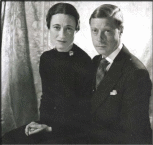
портретная галерея – собрание
портретов известных британцев,
начиная с 16 века и по сегодняшний
день. Посмотрите на одну из
фотографий, размещенных в галерее.
21. a). Прослушайте
диалог и скажите: кто эти люди?
б). Прочтите диалог и
заполните таблицу.
A I love that photo. Who are they?
B I think it´s King Edward VIII and Wallis Simpson. Let´s see. Yes, that´s
right.
A When was he king? I don´t remember a King Edward.
B Well, he was only a king for 11 months, in 1936, I think. He was Queen
Elizabeth II´s uncle.
A Why was he only king for a short time?
B Because he was in love with Wallis Simpson, the woman in the photo. She
was American. The government was against the marriage because she was
divorced. It was a terrible scandal. In the end he abdicated and they got
married.
A Who was the next king?
B His brother, George VI.
A Were Edward and Wallis happy?
B I think they were happy. They were together for the rest of their lives.
|
Present Simple |
Past Simple |
|
I am the king. |
I was the king. |
|
She is divorced. |
She ____ divorced. |
|
They are together. |
They ____ together. |
|
Wallis isn´t British. |
Wallis ____n´t British. |
|
Are Edward and Wallis happy? |
____ Edward and Wallis happy? |
3. Заполните пропуски, используя was, were, wasn´t, weren´t.
1. King Edward VIII and Wallis Simpson … in love. 2. Where … you born? — I … born in Moscow. 3. The capital of Russia in the 19th century … Saint-Petersburg. 4. … Alexander Lodygin and Pavel Yablochkov famous writers? — They … writers, they … Russian inventors. 5. Wallis Simpson … British, she … American. 6. What day … yesterday? 7. Alexander Popov … a famous Russian scientist. 8. Edward … Queen Elizabeth II´s uncle. 9. When we … young, we … good at history. 10. In 2000 the population of Russia … 146,89 million people.
#18 Grammar: past simple
Speaking: Russian national symbols
1
ответьте на вопросы:
a). Where was the girl?
b). Where was the dog?
c). Was it the girl´s dog?
One day Suzie was in the park. She was on a bench, and there was a big dog next to the bench. A man stopped in front of Suzie. He wanted to sit down, but he was a bit nervous. «Does your dog bite?» he asked her. «No, it doesn´t», Suzie replied.
A minute later, the dog closed its teeth round the man´s lag. «Ow!» he shouted. «What do you mean, your dog doesn´t bite? You lied!»
«That isn´t my dog», explained Suzie.
2. Прочтите тексты о национальных символах Российской Федерации. Расскажите о них своими словами.
● The Russian flag is sometimes called the IMPERIAL FLAG. It consists of three equal stripes of white, blue and red. The first flag of this design appeared more than 300 years ago. Peter the Great adapted the flag from the National flag of the Netherlands. Later a black two-headed eagle on a golden background was added to the flag of Russia. The flag existed until the revolution in 1917. In the nineties, with the democratic changes, the three-colour flag was restored again. On 21 August 1991, the flag was officially adopted by the Russian President and the Russian Parliament. In Russia the colours of the current flag symbolize:
• white — frankness and generosity;
• blue — honesty and wisdom;
• red — courage and love.
● The Russian National Emblem is the golden DOUBLE-HEADED EAGLE with a horseman (St George) on a shield on the eagle’s breast with a red background. Above the two heads of the eagle, there is an historical crown.
The first emblem of the double-headed eagle was introduced in 1480, by Prince Ivan III. It was at the time of the establishment of the Russian state system. It symbolized the supreme power and sovereignty of the state.
Since then, the double-headed eagle is the main part of the emblem of our country. But now the crown is a symbol of the sovereignty both of the Russian Federation (as a whole) and of its parts (subjects of the Federation).
3. Раскройте скобки, употребив глаголы в форме the past simple.
1. We (to meet) in a café last night. 2. Max (to see) his friends after work two days ago. 3. We (to plan) our summer holidays two months ago. 4. Martin (to sing) a song at the college concert. 5. We (to have) a dinner at a restaurant the day before yesterday. 6. Tom (to phone) his girlfriend yesterday afternoon. 7. They (to leave) work at 18.00 last week. 8. Alex (to get) up late in the morning yesterday. 9. I (to tidy) my room at the weekend. 10. My girlfriend (to fall) ill three days ago. 11. Last year, we (to grow) potatoes in our garden. 12. Last year, she (to celebrate) Christmas at home. 13. Emily (to lose) her keys yesterday. 14. I (to wear) a new shirt to college the day before yesterday.
4. а). Прочтите диалог. Можете ли вы дать ответы на предложенные вопросы?
Q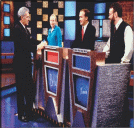
Mike, you win ₤1,000! When
did Neil Armstrong walk on the
Moon?
Mike: Was it in 1_________?
Quiz master: That´s right. Well done! Here´s
your second question. The
Spanish brought potatoes to
Europe in the 1500s. Which
continent did potatoes come
from?
Mike: Sorry, I didn´t hear the question.
Quiz master: Which continent did potatoes come from?
Mike: Did they come from 2_______?
Quiz master: Yes! And your final question, for ₤1,000. The Nobel Peace
Prize started in 1901. Alfred Nobel started it. But what did
Alfred Nobel invent in 1867?
Mike: Did he invent the light bulb?
Quiz master: No, he didn´t! You´ve got one more guess!
Mike: Was it the camera?
Quiz master: No, he didn´t invent the camera. Alfred Nobel invented 3_____!
I´m sorry, Mike!
б). 22. Прослушайте и проверьте, верны ли ваши ответы.
в). Укажите все случаи употребления глаголов в отрицательной и вопросительной форме.
#19 Grammar: past simple
Speaking: Russian regions
1. Запишите отрицательную форму указанных предложений.
1). Jack phoned Sarah yesterday evening. 2). George went to London last weekend. 3). Joe wore his new jacket yesterday. 4). Pete invited Fred to his birthday party. 5). You sent me an e-mail. 6). Wendy left home before nine o´clock. 7). My dad studied German at school.
2. Составьте вопросительные предложения и дайте ответы.
a). you / last night? / go / did / when / to bed.
b). come / how / this morning? / did / you / to college.
c). do / what / you / last Saturday morning? / did.
d). last Sunday? / you / what time / did / get up.
e). this morning? / you / what / did / for breakfast / have.
3. Найдите ошибки в указанных предложениях, запишите верный вариант.
1. Sally catched the bus to town. 2. When you come home last night? 3. Did Mum made a cake yesterday? 4. Kevin not wore jeans to college. 5. We didn´t stayed in last night. We went out. 6. «Did Jamie watch TV last night?» — «Yes, he watched.»
4. 23. a). Прослушайте песню о субъектах Российской Федерации и заполните пропуски.
The Russian regions
The (1) … regions of Russia are classified as follows:
● Republics — there are (2) … republics in the Russian Federation. Republics have some degree of autonomy in government. Each republic has its own constitution, president and parliament. International affairs however are still handled by the federal government.
● Oblasts — there are (3) … oblasts in the federation. An oblast is like a province. They have their own local administrative government but have less autonomy than a republic.
● Krais — there are (4) … krais in Russia. A krai is also known as a territory. They have the same legal status as an oblast. The use of the word krai is traditional, it was used mainly to refer to territories located on Russia’s border regions.
● Autonomous Okrugs — there are (5) … autonomous districts (or okrugs) in Russia. They were setup to provide autonomy to indigenous groups. The level of autonomy fits somewhere between a republic and an oblast. Autonomous Okrugs may have administrative jurisdiction delegated to a nearby oblast.
● Autonomous Oblast — there is (6) … autonomous province in the Russian federation.
● Federal Cities — there are (7) … federal cities: (8) … , (9) … and (10) … . They function as their own region under direct federal control.
б). Используя карту, приведите примеры различных типов субъектов Российской Федерации.
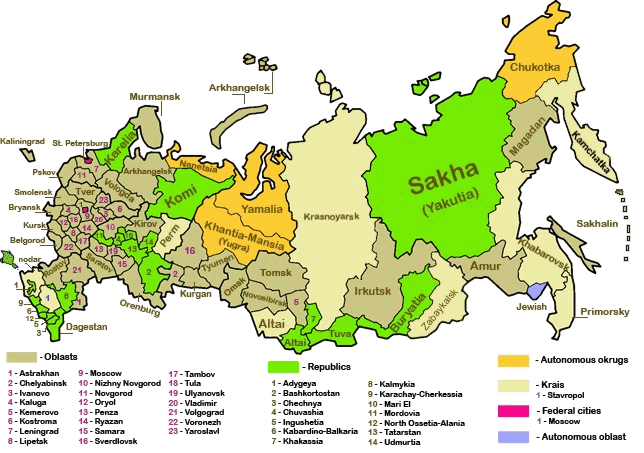
5. 24. Рози спрашивает Роба о том, как он провел свои выходные. Прослушайте их диалог и дополните предложения, используя утвердительную и отрицательную форму глаголов в the past simple.
1. Rob … (to have) a good time at the weekend.
2. Rob and Sam … (to play) football.
3. Rob and Sam … (to go) to the cinema.
4. Rob and Sam … (to see) a film.
5. Rob and Sam … (to take) the right bus.
#20 Grammar: future simple;
Passive voice
1. а). Прочтите заголовок текста. Затем прочтите текст. Какой ответ он дает на вопрос, вынесенный в заголовок?

б). Найдите и запишите по одному примеру утвердительного, отрицательного и вопросительного предложений с использованием the future simple.
2. Отнесите следующие предложения к будущему. Используйте слова: tomorrow, tomorrow evening, the day after tomorrow, next week, next month, next year, in an hour, at two o’clock tomorrow afternoon.
Образец: He studies at the institute. He will study at the institute next year.
1. My sister comes home at about 6 o’clock. 2. My little brother plays in the garden. 3. They live in Moscow. 4. They have English classes twice a week. 5. Anna gets up late. 6. She likes my presents. 7. I go to bed early. 8. He phones his friends.
3. Расспросите своего друга (подругу) о его (ее) планах на будущее, используя эти выражения:
What job / do? How much/ earn? … get married? How old/ be?
… have children? How many? Where/ live?
4. 25. Прослушайте разговор Кристины и Паоло о планах на будущее. Отметьте (+) или (-) те вещи, которые произойдут либо не произойдут.
|
get married |
have children |
go to university |
get a good job |
live abroad |
learn to drive |
become famous |
|
|
Cristina |
|||||||
|
Paolo |
5. Переведите предложения на русский язык, обращая внимание на выделенные фрагменты. В чем заключается различие?
1. The sea separates the British Isles from the Continent. — The British Isles are separates from the Continent by the sea.
2. Ancient people used Stonehenge as a religious site. — Stonehenge was used as a religious site by ancient people.
3. The millionth visitor will visit the Edinburgh castle next year. — The Edinburgh castle will be visited by the millionth visitor next year.
6. Выберите верную форму the past participle этих неправильных глаголов.
a). do – did / done. b). write – written / wrote. c). draw – drawn / drew. d). wear – wore / worn. e). take — taken / took. f). break – broke / broken. g). throw – threw / thrown. h). speak – spoke / spoken.
7. Употребите правильную форму глагола.
1. The roads (cover) with the snow. 2. Chocolate (make) from cocoa. 3. The Pyramids (build) in Egypt. 4. This coat (buy) four years ago. 5. The stadium (open) next month. 6. Your parents (invite) to a meeting. 7. Where is your car? – It (mend) at the moment. 8. The books already (pack). 9. The castle can (see) from a long distance. 10. The guests must (meet) at noon.
8. Измените предложения по образцу.
Образец: Shakespeare wrote “Romeo and Juliet”. – “Romeo and Juliet” was written by Shakespeare.
1. Popov invented radio in Russia. 2. Every four years people elect a new president in the USA. 3. The police caught a bank robber last night. 4. Sorry, we don’t allow dogs in our safari park. 5. The postman will leave my letter by the door. 6. My mum has made a delicious cherry pie for dinner. 7. George didn’t repair my clock. 8. Wait a little, my neighbor is telling an interesting story. 9. My son can write some more articles about football. 10. You must clean your bedroom tonight.
#21 Reading: the USA
1. Переведите географические названия на русский язык, найдите их на географической карте. Объясните употребление артикля.
the Pacific Ocean, the Atlantic Ocean, the Gulf of Mexico, Washington D.C., the Mississippi, the Missouri, the Colorado, the Sacramento, New York, Los Angeles, Chicago, Philadelphia, Detroit, San Francisco, the Rocky Mountains, the Cordillera, the Sierra Nevada.
2. a). Прочтите текст.
The United States of America
The United States of America is the fourth largest country in the world (after Russia, Canada and China). The USA lies in the central part of North America. The total area of the country is about nine and a half million square kilometres. Its western coast is washed by the Pacific Ocean. Its eastern coast is washed by the Atlantic Ocean and the Gulf of Mexico. The USA borders on Canada in the north and on Mexico in the south. It also has a sea-border with Russia.
The climate of the country varies greatly from arctic in Alaska through continental in the central part to subtropical in the south.
♦♦♦
The USA is a federal republic. It consists of fifty states and the District of Columbia. The capital of the country is Washington D. C. The population of the USA is about 250 million people. Each state has its own government.
The seat of the federal government is Washington D. C. According to the US Constitution the powers of the government are divided into 3 branches. They are the executive, the legislative and the judicial. The executive is headed by the President and his Administration. The legislative is exercised by the US Congress. The judicial is headed by the US Supreme Court.
The Congress consists of the Senate and the House of Representatives. There are two main political parties in the USA, the Republican and the Democratic.
♦♦♦
The flag of the USA is called «Stars and Stripes.» There are three colours on the flag of the USA. They are red, white and blue. As there are fifty states in the USA, there are fifty stars on the American flag: one star for each state.
The American flag has thirteen stripes. The stripes are red and white. The flag has seven red stripes and six white stripes. There is one stripe for each of the first thirteen colonies which in 1776 became independent of England.
The eagle became the official national symbol of the country in 1782. It holds an olive branch (a symbol of peace) and arrows (symbols of strength) in its paws.
The USA has an official song. It is called The Star Spangled Banner.
♦♦♦
The USA is one of the greatest industrial and leading agricultural nations in the world. The USA produces around 25% of the world’s industrial products, agricultural goods and services.
The USA is rich in coal, iron and oil. Many rivers cross the country. The most important are the Mississippi, the Missouri, the Colorado, the Sacramento. The main lakes are the Great Lakes in the north.
The largest cities are New York, Los Angeles, Chicago, Philadelphia, Detroit, San Francisco, Washington and others. The highest mountains are the Rocky Mountains, the Cordillera and the Sierra Nevada.
b). Дополните предложения:
1. The USA borders … . 2. There are …… states in the USA. 3. The … became the official national symbol of the country in 1782. 4. Many rivers cross the country. The most important are … . 5. The USA is one of the greatest … . 6. The climate of the country varies … . 7. The population of the USA is … . 8. The total area of the country is … . 9. There is one stripe for … . 10. The capital of the country is … .
c). Прочтите начало предложения и найдите в тексте его окончание.
1. The USA has an official song. It is called …
2. The Congress consists of …
3. The USA lies in the …
4. Its eastern coast is washed by …
5. According to the US Constitution …
6. The largest cities are …
7. The USA produces around …
8. There are two main political …
d). Вставьте пропущенное слово, используя информацию из текста.
1. The USA has … with Russia. 2. The American flag has thirteen … . 3. The USA is one of the most … and highly … countries in the world. 4. The USA is rich in …, … and … . 5. Each state has its own … . 6. The USA produces around 25 per cent of the world’s industrial … goods and … . 7. The flag of the USA is called … .
МИНИСТЕРСТВО ОБРАЗОВАНИЯ САРАТОВСКОЙ ОБЛАСТИ
Государственное автономное профессиональное образовательное
учреждение Саратовской области
«Пугачевский аграрно-технологический техникум»
РАБОЧАЯ ТЕТРАДЬ ПО ОУД.03
АНГЛИЙСКИЙ ЯЗЫК
к учебнику Планета английского языка
Пугачев
2021
#1 Grammar: personal pronouns, possessive pronouns, the verb to be, have got
1. Вставьте подходящие по смыслу личные местоимения.
1. Ben is a little boy. … is six.
2. Max is a soldier. … is brave.
3. Lily is a young woman. … is very beautiful.
4. Nick and Ann are far from Moscow. … are on a farm.
5. This is Ben’s room. … is nice.
6. These are new books. … are interesting.
7. This is Elsa. … is a student.
8. Nick and Max are students. … are students of a college.
9. The rooms are small but … are light and warm.
10. Hans is a new student. … is from Germany.
2. Вставьте соответствующие личные местоимения в предлагаемых ответах на вопросы.
1. Is your house new? – Yes, … is.
2. Are the students at the English lesson now? — Yes, … are.
3. Is your college in Green Street? – Yes, … is.
4. Are Helen and Bess your sisters? – Yes, … are.
5. Is Ben’s sister an engineer? – Yes, … is.
6. Are the pencils red? – No, … are not.
7. Is this room comfortable? — No, … isn’t.
8. Is Ben on holiday now? – No, … isn’t.
9. Is Helen nice? — Yes, … is.
10. Are you an engineer? — Yes, … am.
3. Заполните пропуски соответствующей формой глагола to be.
1. You …… from Australia.
2. My English teacher …… Mr Simpson.
3. I …… seventeen years old.
4. My pencil …… in my bag.
5. We …… at home.
4. Составьте предложения, используя отрицательную форму глагола to be.
1. This coffee / hot.
2. Sam / in the classroom.
3. We / eighteen years old.
4. They / from Spain.
5. I / hungry.
5. Образуйте из предложенных слов вопросительные предложения. Затем подберите к ним подходящие по смыслу ответы.
1. Martin / name / your / is / ?
2. you / are / Russia / from / ?
3. at / home / is / dad / your / ?
4. teachers / and Helen / are / Ben / ?
5. Sarah / is / hungry/ ?
a). Yes, he is. b). No, they aren´t. c). No, it isn´t.
d). Yes, she is. e). Yes, we are. f). Yes, I am.
6. Вставьте притяжательные местоимения.
1. Is your bag new? — Yes, … bag is new .
2. I like … hat, Ann.
3. Don’t plant this tree! … branch is broken.
4. Max, you have a new job. Do you like … new job?
5. … friends always tell me everything.
6. Our dog likes to run after … tail.
7. Вставьте вместо пропусков подходящую форму выражения have got.
1. I … a comfortable flat.
2. Nick … many friends.
3. They … a lot of flowers in their garden.
4. She … long hair.
5. The farm … two new tractors.
6. You … a good collection of stamps.
7. We … a nice house.
8. The cat … three kittens.
8. Образуйте вопросительную форму и дайте ответы.
1. Ann has got a new coat.
2. Nick has got a scooter.
3. They have got an old garden.
4. The hunter has got a dog.
5. You have got two apple-trees in the garden.
#2 Vocabulary, reading & writing: describing people
1. Соотнесите описание с подходящей картинкой.
a). Molly is middle-aged. She has got a nice face and dark hair. She`s rather fat.
b). Peggy is young and slim. She is even rather thin. She has got fair hair and regular features.
c). Alice is charming and very feminine. She has got long blond hair and nice legs.
d). Mary likes sport. She`s rather athletic. She`s slim and well-build. She has got dark hair.
e). John is middle-aged. He`s rather heavy-set. He has got a beard and he wears dark glasses.
f). Ron is handsome. He has got regular features. He hasn´t got a moustache.
g). Jack is short but he`s well-build and elegant. He has got fair hair.
h). Tom is very handsome. He`s tall, athletic and well-dressed. He has got blond hair.
i). Michael is good-looking. He has got long dark hair, a beard and a moustache.
1. 




6.



2. Прочтите текст, определите верны ли следующие утверждения:
As you know people from different countries do not look the same. For example, people from Denmark, Norway and Sweden are usually tall. They have got fair hair, blue eyes and a pale skin.
Most people in Italy, Spain and Greece are short. They have got black or dark brown wavy hair, brown eyes and light brown skin.
Most people from Africa have got black curly hair and very dark skin. They have also got dark brown eyes, full lips and a wide, flattish nose.
People from Arab countries have got dark hair and dark brown eyes. They have got dark skin.
a). People from Norway and Sweden have got fair hair, brown eyes and light brown skin.
b). Most people in Italy, Spain and Greece are short and have got dark straight hair and dark brown eyes.
c). People from Africa have got black curly hair and very dark skin.
d). People from Arab countries have got fair hair, blue eyes and a pale skin.
3. Подберите черты характера с противоположным значением.
|
|
4. Напишите текст о себе, выбрав подходящий вариант:
Hi! My name is … I am fifteen (sixteen, seventeen, eighteen). I live in Pugachev.
I am tall (not very tall, short, of middle height). I am thin (not very thin, rather plump). My face is round (square, oval). I have got a fair (dark) skin. I have got a straight (upturned, crooked) nose. I have got large (small) blue (hazel, black, grey) eyes. My hair is black (fair, dark, blond, chestnut), straight (curly) and long (short, not very long). I am (sociable, easy-going, stubborn, reliable) person.
I study at the polytechnic college. I like my future profession and I am going to do my best to become a good cook (welder, tractor driver, car mechanic).
#3 Vocabulary: members of the family, possessive ´s
1. Проанализируйте семейное древо семьи Холли и дополните предложения, используя следующие слова:

wife — жена
husband — муж
mother, mum — мама
father, dad — папа
son — сын
daughter — дочь
brother — брат
sister — сестра
grandmother — бабушка
grandfather — дедушка
grandson — внук
granddaughter – внучка
aunt — тетя
uncle — дядя
niece — племянница
nephew — племянник
cousin – двоюродный
брат (сестра)
1. James is Holly´s … . 6. Owen is her … .
2. Leo is her … . 7. Sarah is her … .
3. Kate is her … . 8. Charlie is her … .
4. Emma is her … . 9. Elliot is her … .
5. Alice is her … .
2. Укажите родственные связи членов семьи Холли.
1. Leo is Sarah´s … . 9. Sara is Leo´s … .
2. James is Emma´s … . 10. Emma is James´ … .
3. Holly is Kate´s … . 11. Kate is Holly´s … .
4. Grace is Elliot´s … . 12. Elliot is Grace´s … .
5. Kate is Owen´s … . 13. Owen is Kate´s … .
6. James is Kate´s … . 14. Kate is James´ … .
7. Alice is Sarah´s … . 15. Sarah is Alice´s … .
8. Charlie is Owen´s … . 16. Owen is Charlie´s … .
3. Вставьте пропущенные слова.
children – дети
grandchildren — внуки
grandson — внук
granddaughter — внучка
parents – родители
grandparents — бабушка и дедушка
a). son + daughter = ?
b). mother + father = ?
c). grandmother + grandfather = ?
d). grandson + ? = ?
#4 Grammar: present simple Speaking: talking about family, duties about the house
1. Поставьте глаголы в скобках в the Present simple tense.
1. Сhildren (to like) to play computer games. 2. My sister (to read) English and French books. 3. Our cousin (to live) in the village. 4. Their son (to go) to school every day. 5. I (to want) to become a worker. 6. My grandmother (to take) me by the hand. 7. I (to see) my niece on Fridays. 8. My brother´s wife (to teach) Russian at school. 9. Our sister (to live) in the USA. 10. I always (to get) up at 7 o´clock.
2. Составьте предложения из следующих слов. Переведите эти предложения на русский язык.
1. every Monday, at a hospital, my wife, works.
2. watches, her son, TV, often.
3. by car, always, goes, their uncle, to the office.
4. my brother, early, home, usually, comes.
5. to listen to music, in the garden, seldom, your grandfather, likes.
3.
a). Образуйте форму 3-го лица единственного числа the Present simple tense следующих глаголов:
to sit, to read, to skate, to do, to ask, to see, to come, to wash, to teach, to fly, to mix, to play.
б
to y – he / she / it ies
). Распределите их в следующие группы: —s [s], —s [z], —es [iz].
4. Выразите несогласие со следующими утверждениями.
Образец: They get up early. — They don´t get up early.
He speaks French. — He doesn´t speak French.
1. Her children learn English. 2. Tom’s sister lives in a small village. 3. The boys like basketball. 4. He knows my address. 5. The farmers grow potatoes here. 6. Mary teaches at school. 7. We go to the country in summer. 8. I go to the office by bus. 9. They watch TV in the evening. 10. The students of our group study English. 11. Ann and Mary play tennis. 12. My parents like ice-cream. 13. Our granddaughter lives in the USA. 14. I study at the university.
5. Составьте предложения из следующих слов. Переведите их на русский язык.
1. New York, children, live, in, don´t, Tom´s.
2. pizza, brother, eat, doesn´t, my.
3. Lady Gaga, like, my, don´t, friends.
4. their, doesn´t, in, a hotel, uncle.
5. parents, speak, don´t, her, English.
6. Вставьте вместо пропусков do, does, don´t, doesn’t.
a). … your dad work in Abakan? – No, he …
b). … your cousins live near the school? – Yes, they …
c). … your grandfather use computer? – No, he …
d). … her lessons start at 9 o´clock? – Yes, they …
e). … his niece drink coffee? – No, she …
7. 01. Прослушайте три рассказа и соотнесите говорящего с тем, что он рассказал:
a). I like our home to be clean and tidy. I enjoy helping my parents.
b). My duties about the house are to clean the rooms, to wash the dishes after meals, to do the shopping.
c). I have problems with my parents because they don´t like that I don´t clean my room.
Speaker 1
Speaker 2
Speaker 3
8. Заполните пропуски словами: set, wash, clean, wash, cook, broom, make, iron, sweep, rake the leaves, water
1. Every morning I ____ the plants.
2. My father usually ____ the dishes.
3.My mother usually _____ the meal.
4. Jack is a lazy boy. He never _____ in the garden.
5. I always ___ the floor with a mop.
6. I usually _____ the table before meals.
7. My brother sometimes _____ the window.
8. Tom always helps at home. He usually ______ his bed in the morning.
9. I usually sweep the floor with a ______.
10. My sister ______ the laundry.
11. I always _____ the floor at home.
9
-
clean
-
water
-
mop
-
vacuum
-
sweep
-
take out
-
dust
-
do (x2)
-
cook
-
make
-
wash
-
the floor (x2)
-
the furniture
-
the windows
-
the bed
-
the room
-
the rubbish
-
the ironing
-
the carpet
-
the plants
-
dinner
-
the shopping
. Подберите пару
10. Изучите список домашних обязанностей и соотнесите картинки с нужным номером:

11. Выберите правильную подпись к картинке.

#5 Vocabulary: the house, prepositions of place. Grammar: there is/there are. Listening: dialogue to describe the house.
Speaking: the house
1. Найдите данные слова на рисунке и переведите их на русский язык.

A. ROOMS (#1-10)
a bathroom
a bedroom
a dining room
a garage
a garden
a hall
a kitchen
a living room
a study / an office
a toilet
a celler/ a basement
an attic / a loft
a roof
B. PARTS OF A ROOM (#11-15)
a balcony
the ceiling
the floor
the stairs
the wall
the door
the corner
the window
C. THINGS IN A ROOM (#16-31)
an armchair
a bath
a bed
a carpet
a cooker
a cupboard
a fireplace
a fridge
a lamp
a light
a mirror
a plant
a shelf (shelves)
a shower
a sofa
a washing machine
REMEMBER!
the stairs
upstairs
downstairs
the FIRST FLOOR in Russia = the GROUND FLOOR in the UK.
2. a). Заполните таблицу, используя данные выражения.
|
Room |
W a). have a shower, b). cook dinner,
c). watch television, d). sit outside, e). sleep in the bed, f). read newspapers, g). drink a cup of tea, h). take a bath, i). put on clothes, j). grow flowers hat we do |
|
a kitchen |
|
|
a living room |
|
|
a bedroom |
|
|
a bathroom |
|
|
the garden |
б). Расскажите о том, что вы и члены вашей семьи делают в указанных помещениях. Используйте слова: always, usually, often, sometimes.
3. Выберите правильный вариант, переведите на русский язык.
1. There is / There are a bath in the bathroom. 2. There is / There are posters in my bedroom. 3. There isn´t / There aren´t a fireplace in our dining room. 4. There are / There aren´t any plants in my brother´s house. 5. There isn´t / There aren´t a computer in the hall. 6. There is / There are a fridge in the kitchen.
4. Дополните диалог подходящими формами оборота there is / there are и, если необходимо, any.
— Hello. I´m interested in the flat to rent.
— Oh, OK. Let me tell you about it. (1) … a large living room and (2) … a small kitchen.
— (3) … a table in the kitchen?
— No, (4) … . But (5) … a very nice dining room with a table and some chairs.
— That´s fine. What about the bedrooms? How many bedrooms (6) … ?
— (7) … three bedrooms and a bathroom.
— (8) … a shower in the bathroom?
— Yes, (9) …
— Good. (10) … bookshelves in the living room?
— No, I´m sorry. But (11) … some cupboards.
— That´s OK. I think it´s perfect for us. How much is it?
5. Составьте предложения, используя предлоги места.
There is a ghost …

… behind… … in … … under …

… over … … in front of … …next to …

…between… … opposite … … on …
6. Закончите описание комнаты Тома.

This is Tom´s room. It´s large and light. There is a bed … . There is a desk … . Tom´s computer is … . There is the lamp … . There are some shelves with books … . There is a small TV … . Tom´s wardrobe is … . There are some posters … . There isn´t any carpet … . Tom´s guitar is … . There aren´t any plants … because Tom doesn´t like them.
7. Опишите свой дом (квартиру), дополнив предложения.
My family is … (large, small). We all live in our … (house, flat). Each of us has his favorite place. My father’s favorite room is … (the living room). There are … (a flat-screen TV, a wall unit, a sofa, two armchairs) in our … . He usually … (watches TV, reads newspapers) there. My mother’s favorite place is our … (kitchen). She … (cooks there my favorite dishes, likes to sit with a cup of coffee). My favorite place is my … (bedroom). It isn´t large, but … (cosy, light, and stylish). The wall colour is … (light, dark). The furniture there is … (modern, stylish). There is … (a bed, a desk, a wardrobe) in my bedroom. I like … (to listen to music, to play computer games) there.
8. 05. Луиза и Эрик прибыли на выходные в Шотландию и остановились в гостинице. Прослушайте диалог и укажите какие вещи имеются в гостинице, а какие отсутствуют:
□ a lift □ TV □ Wi-Fi □ a restaurant □ a bar □ a great view
living-room

painting
carpet
bookcase

window – окно
wall – стена
floor – пол
ceiling – потолок
corner – угол
bedroom

desk
chair

window – окно
wall – стена
floor – пол
ceiling – потолок
corner – угол
9. 04. Семейная пара подыскивает дом для проживания. Прослушайте их диалог с хозяйкой дома. Вставьте пропущенные слова.
Kim: The garden is wonderful, I love it.
Leo: Is there a garage?
Barbara: Oh, yes, there´s a big garage over there. Let´s go inside the house. … This is the (1) _______ . There are five rooms on this floor, the kitchen, the (2) __________, the living room, the (3) _________, the library…
Leo: Wow! There´s a library, Kim!
Barbara: This is the living room.
Kim: I love the furniture, the old sofa, the armchairs, (4) __________.
Barbara: And this is the (5) __________ . It´s very big, as you can see.
Kim: Is there a dishwasher?
Barbara: No, it isn´t. It´s an old house, you see.
Leo: Never mind. I think it´s lovely. Is there a (6) ___________ downstairs?
Barbara: Yes, there´s one downstairs and there are three upstairs.
Kim: Are there any neighbours with children?
Barbara: No, there aren´t any neighbours near here. But there are some families with children in the village.
Kim: That´s great. You lived in this house, is that right, Mrs…?
Barbara: Call me Barbara, dear. Yes, I lived here. A long time ago. Now I live in the village. Let´s go upstairs.
#8 Vocabulary & listening: numerals, the dates,
telling the time, prepositions of time
1. 06. Прослушайте названия числительных, укажите в них ударные слоги.
1. a). 13 b). 30; 2. a). 14 b). 40; 3. a). 15 b). 50; 4. a). 16 b). 60;
5. a). 17 b). 70; 6. a). 18 b). 80; 7. a). 19 b). 90.
2. Запишите числительные словами.
a). Количественные числительные:
3, 5, 11, 12, 13, 24, 69, 325, 1005, 530425.
б). Порядковые числительные:
1, 2, 15, 23, 84, 149, 150, 208, 1000, 2000000.
3. 07. Прослушайте даты и запишите их.
___ January, ___ February, ___ March, ___ April, ____May, ___ June, ___July, ___ August, ___ September, ___ October, ___ November, ___ December.
4. Запишите цифрами следующие даты.
a). the first of March nineteen seventy-six; b). the fifth of December two thousand; с). the sixteenth of May nineteen o five; d). the third of July nineteen hundred.
5. Переведите на английский язык.
1). 7 марта 1999 года. 2). 1 сентября 1977 года. 3). 20 апреля 1911 года. 4). 12 марта 1950 года. 5). 12 декабря 2024 года.
6. Решите примеры и запишите ответы словами.
a). sixty-two — fourteen = …
b). fifteen + two hundred and forty-six = …
c). ninety + ten = …
d). thirty-one + nineteen = …
e). seventy-three + eighty-two = …
f). three thousand one hundred and twelve — ninety-nine = …
7. Вставьте пропущенные предлоги.
1. My dad´s birthday is … 3rd April. 2. I like watching TV … evening. 3. Her brother Alex does his morning exercises … the mornings. 4. Our niece was born … 1995. 5. The party is … Sunday. 6. `Mary and Lora often play volleyball … Monday morning. 7. We arrive home late … night. 8. This year the Christmas is celebrated … Wednesday the 7th of January. 9. They don´t watch TV … afternoon. 10. … 2011 Prince William married Catherine Middleton.
8. Запомните слова, использующиеся для обозначения времени.

9. Укажите который сейчас час.

#9 Vocabulary & listening: everyday activities
Grammar: adverbs of frequency
Writing: my working day
1. а). Опишите типичный день Лизы, используя следующие выражения:

to get up early
to have breakfast
to have a shower
to go to work by bus (by car)
to start work

to have lunch
to finish work
to go home
to go shopping
to go to the gym

to make dinner
to have dinner
to do housework
to watch TV
to have
a bath
to go to bed
late
б). В какое время вы делаете указанные действия?
2. Как часто вы делаете указанные действия? Используйте always, usually, often, sometimes, never.
—
100%
always
listen to the radio in the car,
— read newspapers in the morning,
—
usually
speak English outside class,
— watch TV in the evening,
—
often
50%
have pasta for lunch,
— clean the rooms at the weekend.
—
sometimes
eat fast food,
— drink cola,
—
0%
never
play computer games,
— do my home work.
3. 08. Прослушайте рассказ Лиэма о том, как он проводит свой субботний день. Выберите верный вариант.
a). Liam usually gets up early / late in the morning.
b). Liam never / always has breakfast.
c). In the afternoon Liam usually / often go out with his friends.
d). In the evening Liam often / sometimes watches sports on TV with his dad.
e). Liam is never / usually tired at 10 o´clock.
f). Liam is sometimes / always in bed before midnight.
4. Познакомьтесь с распорядком дня Майка. Используя текст как образец, составьте рассказ о вашем распорядке дня.
Mike is a first year student of the Technical College. He goes to the College every day except Sunday. Mike’s classes begin at 8.00. He lives far from the College, so he must get up very early. The alarm clock wakes him up at 6.30 a.m. Sometimes he turns off the alarm and lies in bed until his mother wakes him up again.
He jumps out of bed, opens the window, does his morning exercises to the music, makes the bed and goes to the bathroom. In the bathroom he always takes a cold or a warm shower and cleans his teeth. Then he goes back to his room and gets dressed.
In some minutes he is ready for breakfast. He usually has a cup of tea or coffee and a sandwich or two. Mike is always in a hurry because he doesn’t want to be late for classes. At 7.30 he leaves home for the College. He usually gets to the College by bus. It takes him about half an hour to get to the College.
He comes to the College some minutes before the bell rings. Mike has enough time to get everything ready for his classes. His days are not like each other because he has a different timetable every day. As a rule he has 6 lessons a day. Mike does his best not to miss classes because he knows that missing classes is a sure way to fail at exams. At 11.10 o’clock he has a break for lunch. Mike goes to the canteen. After the break classes go on. They are usually over at about 3 o’clock.
After classes Mike usually goes home. After a day of hard work Mike feels very tired and he hurries home. At home he has dinner and a short rest, then he does his homework and helps his mother about the house. In the evening Mike watches a serial or a detective story on TV. Sometimes he goes out with his friends. Mike goes in for sports. Twice a week he plays volleyball in the College gym. He returns home at 8 p.m. and has supper. At about 12 o’clock Mike goes to bed.
#10 Vocabulary, listening & speaking: free-time activities
Grammar: love, like, hate +Ving
1. Соотнесите название хобби с фотографией.






a). camping
b). buying clothes
c). cooking
d). cycling
e). flying
f). going to the cinema
g). reading
h). running
i). swimming
j). painting
k). travelling
l). watching DVDs
2. Прочтите анкеты 6 человек с сайта знакомств. Сможете ли вы подобрать пары? Объясните ваш выбор.






Образец: Isabella and … , because she loves … and he likes …
3. Образуйте глагольные формы с –ing окончанием следующих слов, заполните таблицу.
cycle, drive, listen, make, park, play, run, shop, serf,
study, swim, travel, write, draw, knit, sew, cook, ride, fish
|
+ ing |
e |
согласная*2 + —ing |
4. Переведите предложения на английский язык.
1. Моя сестра любит танцевать. 2. Моему отцу не нравится ездить на работу на машине. 3. Мой друг увлекается бегом. 4. Ей не нравится делать покупки по выходным. 5. Я люблю готовить ужин для всей семьи. 6. Их бабушка любит вязать и шить. 7. Его родители увлекаются рисованием. 8. Вам нравится рыбачить зимой? 9. После занятий я люблю работать в интернете. 10. Нам не нравится учиться в субботу.
5. 09. Арчи и Шарлот встречаются в кафе. Прослушайте их беседу и укажите, верны ли следующие утверждения:
1. ___ Charlotte and Archie drink green tea.
2. ___ Archie is a student.
3. ___ They love walking.
4. ___ They don´t like camping.
5. ___ They like eating fast food.
6. ___ They don´t like Japanese food.
6. Прочтите текст. Разделяете ли вы описанные увлечения? Расскажите, что вы любите делать в свободное время.
Hobby is a special interest that people do in their free time. Everybody has his/her own hobby.
I like to listen to music. Now I have got a compact disc player, my parents´ gift, and I collect compact discs. I like different music, it only should be good. I collect discs of my favourite groups and singers. I carefully study the information printed on disc booklets. I try to find everything about my favourite singers. Also I like to watch music programmes on TV. I want to keep up with the news in the world of music.
Of course, I like to spend my spare time with my friends. We talk about all sorts of things (teachers, girls). We discuss films, books, TV programmes. If the weather is fine, we like to be in the open air. We find a nice place somewhere in the forest. We make a fire, bake potatoes and have a lot of fun. When the weather is bad, my friends come to my place. We have a good time together.
#11 Vocabulary: post address, places in town
Grammar: wh-questions
Listening: giving directions
1. Найдите слова, показанные на картинках.


|
l |
e |
t |
t |
e |
r |
b |
o |
x |
|
s |
n |
a |
b |
s |
d |
e |
f |
p |
|
t |
v |
f |
p |
a |
p |
e |
r |
o |
|
a |
e |
a |
d |
d |
r |
e |
s |
s |
|
m |
l |
e |
t |
t |
e |
r |
l |
t |
|
p |
o |
s |
t |
c |
a |
r |
d |
m |
|
h |
p |
o |
s |
t |
e |
r |
k |
a |
|
j |
e |
i |
y |
w |
d |
d |
e |
n |
2. a). Познакомьтесь с правилами написания зарубежных почтовых адресов.

б). Напишите собственный почтовый адрес.
3. Вы знакомитесь с новым другом (подругой) по Интернету. Используя данные слова, запишите вопросы, которые вы ему (ей) зададите.



4. Соотнесите следующие слова с местами, обозначенными на карте.
art gallery bank bus stop car park church cinema concert hall leisure centre library museum park police station post office shopping center theatre tourist information centre town hall train station
5. 10. Определите о каких местах в городе идет речь.
1. ______ 2. ______ 3. ______ 4. ______ 5. ______ 6. ______
7. ______ 8. ______ 9. ______ 10. _____ 11. _____ 12. _____
6. Соотнесите указания направления с изображениями.

a). go straight on
b). take the first left
c). take the second right
d). go past the church
7. 11. Прослушайте диалоги. Используя карту выше, следуйте приведенным в них инструкциям (стартовая точка «You are here»). Укажите конечный пункт назначения.
1. _________ 2. _________ 3. _________ 4. _________ 5. _________
#12 Vocabulary: food, shops
Grammar: quantity: countable and uncountable nouns, some/any
Listening: dialogues in shop
1. а). Соотнесите указанные слова с изображениями.

apples bananas beef butter cabbage carrots cheese chicken eggs grapes ham lamb lemons mushrooms onions oranges peppers pork potatoes prawns rice salmon tomatoes tuna
б). Сгруппируйте товары из части а) по видам магазинов, в которых их можно купить.
2. Образуйте словосочетания и переведите их на русский язык.
a loaf cheese
a bottle toothpaste
a slice soup
a liter sardines
a glass bread
a bar of lemonade
a jar meat
a kilo wine
a tube soap
a tin orange jam
a plate chocolate
3. Выберите правильный вариант, обращая внимание на правильное использование исчисляемых и неисчисляемых существительных.
1. Alex has got much information / informations about our travel. 2. Their sister wants to buy new furniture / furnitures. 3. Your hair / hairs is fair. 4. My granny always gives me some advice / advices. 5. It´s healthy to drink fresh water / waters. 6. Her dad doesn´t buy new sunglass / sunglasses.
4. Вставьте some или any.
1. There are … students in the library. 2. There isn’t … light in the room. 3. Mary has got two sisters but she hasn’t got … brothers. 4. I don’t like popular music but … people like it. 5. Has mother … meat for dinner? – Yes, she has … . 6. Are there … mistakes in Nick’s dictation? – No, there are not … . 7. Has Max … friends here? – Yes, he has … . 8. Has Bess … interesting books to read? – No, she hasn’t … . 9. Would you like … coffee? 10. Can I have … tea, please?
5. 11. Прослушайте диалоги и ответьте на три вопроса о каждом покупателе:
a). Which department the customer in?
b). What does the customer want to buy?
c). Has the shop got what the customer wants?
#13 Vocabulary: sports
Grammar: comparative adjectives, superlative adjectives;
comparison of adjectives
1. а). Найдите соответствия.

a). archery
b). athletics
c). badminton
d). baseball
e). basketball
f). boxing
g). cricket
h). fencing
i). ice hockey
j). karate
k). netball
l). rowing
m). ski jumping
n). snowboarding
o). surfing
p). volleyball
q). wrestling
r). weightlifting
б). Распределите виды спорта из части а) в следующие группы (некоторые виды спорта могут быть отнесены к разным группам):
— winter sports, — combat sports, — team sports,
— indoor sports, — outdoor sports
2. Назовите представленные на пиктограммах виды спорта.

a). b). c).

d). e). f).

g). h). j).
3. Выберите правильный вариант степени сравнения прилагательного. Переведите предложения на русский язык.
1. Nick is (happier, the happiest) boy that I know. 2. Of the six cars, I like the silver one (better, best). 3. Jane’s notebook is (cheaper, the cheapest) than mine. 4. This is (more delicious, the most delicious) cheese-cake I have ever had! 5. This bookcase is (more beautiful, the most beautiful) than that one. 6. Do you feel (better, the best) today than yesterday? 7. I think my cat is (prettier, the prettiest) of all the cats in the world. 8. Steve Jobs is (more famous, famouser) than Stephen Wozniak. 9. This week the weather is (hotter, more hot) than last week. 10. Our new house is (more expensive, expensiver) than the old one.
4
Ewan is taller than Ryan.
Ryan is shorter than Harry.
Harry is taller than Evan.
Lewis is shorter than Evan.
Jack is shorter than Ryan.
Lewis is taller than Ryan.
5. Подберите каждому предложению подходящие по смыслу фразы с прилагательными.
аs slow as a turtle (медленный как черепаха) – as pretty as a rose (красивый как роза) – as high as a mountain (высокий как гора) – as white as snow (белый как снег) – as hot as fire (горячий как огонь) – as pale as the moon (бледный как луна) – as brave as a lion (отважный как лев) — as clear as a bell (чистый как колокольчик) – as blue as the sky (синий как небо) – as busy as a bee (занятой как пчела) – as clumsy as a bear (неуклюжий как медведь) – as strong as steel (крепкий как сталь) – as light as a feather (легкий как пушинка) – as free as a bird (свободный как птица) – as true as a dog (верный как пес) – as cold as ice (холодный как лед)
1. My friends are … 2. Those buildings are … 3. Her voice is … 4. She has got 5 children and she is always … 5. You look ill, your face is … 6. Put on your coat. Your hands are … 7. Her teeth are … 8. Bob is a real man. He is … and his character is … 9. Their daughter looks like an angel, she is … 10. What colour are her eyes? – They are … 11. You have broken my chair. You are … 12. I can’t stand on the sand. It’s … 13. When I am in love I feel … 14. At the top of the mountain I started feeling …
#14 Vocabulary: sports
Grammar: comparative adjectives,
superlative adjectives
Listening: sports commentaries
1. Составьте из данных слов предложения, переведите их на русский язык.
a). most – the Mona Lisa – in – is – painting – the – famous – the – world.
b). longer – the Don – is – the Volga – than.
c). more – Spain – Germany – than – beautiful — is.
d). London – city – in – biggest – the – England – is.
e). the – team – Adam – is — worst – the – player – in.
2. Соотнесите название игры с текстом.
— football — baseball — basketball — cricket — chess
1. It is a game of two players. Each of then starts with sixteen different playing pieces to move on the board. The aim is to move your pieces so that your opponent’s king will be taken.
2. This game is played on a court with a large orange ball. There are five players in each team. Two teams try to score goals by throwing a ball through a net fixed to a metal ring at each end of court. The players bounce the ball while running, and pass it to each other. The team with the most points wins.
3. It is a game between two teams and is played on a field with a bat and a small white ball. Each team consists of nine players. The teams take turns playing in the field and batting the ball. The game has nine innings.
4. It is a game played between two teams of eleven players. Players kick a ball around a field trying to score a goal. The team with the most points wins. This game is very popular in Russia and all over the world.
5. It is sometimes called an English national game. It is known that people played it in England as early as 1550. It is a very long game. International matches last for 5 days. This game is not played only by men; girls and women play it too.
3. 13. Прослушайте диалог между Эми и Алексом.
a). О каких видах спорта идет речь в разговоре?
— volleyball — American football — swimming — tennis — basketball
— football (soccer) — rollerblading — gymnastics
b). Отметьте следующие суждения как верные или неверные.
1. Amy goes rollerblading every day.
2. Alex likes playing tennis, but he doesn´t like watching it on TV.
3. Amy likes watching American football games.
4. Alex plays football in his school team.
4. 14. Прослушайте фрагменты спортивных репортажей и соотнесите их с изображением. Определите, о каких видах спорта идет речь.

1. ___________ 2. ___________ 3. __________ 4. ___________
5. Раскройте скобки, употребляя нужную форму прилагательного.
1. Her eyes are (grey) than mine. 2. He is (fat) man in the village. 3. My sister is (tall) girl in our class. 4. Who is (attentive) in your group? 5. It is autumn. Every day the air becomes (cold), the leaves (yellow). 6. Oil is (light) than water. 7. The (tall) trees in the world grow in California. 8. This is (beautiful) view I have ever seen in my life. 9. The Volga is (short) than Mississippi. 10. Which building is (high) in Moscow? 11. She speaks Italian (good) than French. 12. January is (cold) month of the year.
6. Вставьте as… as… или so… as… .
1. Mike is … tall … Pete. 2. Kate is not … nice … Ann. 3. My room is … light … this one. 4. Sergei is … old … Mike. 5. She is … young … Tom´s brother. 6. Nick´s English is not … good … his friend´s. 7. I am not … tall … Pete. 8. Alex is … lazy … his brother. 9. This child is not … small … that one. 10. A football match isn´t … exciting … a hockey match.
#15 Vocabulary: transport
Grammar: present continuous
1. а). Найдите соответствия.


bike boat bus car coach helicopter lorry motorbike plane
scooter ship taxi train tram underground train van
b). Распределите виды транспорта из части а) в следующие группы: — land, — air, — sea.
2. Перефразируйте следующие предложения таким образом, чтобы остался тот же самый смысл.
go by bike = cycle
go by car = drive
go by bus, train, taxi, plane = take (catch) bus, train, taxi, plane
go on foot = walk
give somebody a lift to… = drive somebody to…
1. Dad sometimes drives to work.
Dad sometimes … to work … .
2. My brother drives me to the underground station.
My brother … me … to the underground station.
3. Michelle never goes to college by bike.
Michelle never … to college.
4. On Mondays, Harry takes the tram to college.
On Mondays, Harry … to college … .
5. Do you go to the beach on foot?
Do you … to the beach?
6. We always walk on town.
We always … on town … .
7. My Mum usually goes to London by car.
My Mum usually … to London.
3. 15. Прослушайте звуки и расставьте их в правильном порядке:
□ babies are crying
□ dogs are barking
□ people are talking loudly or arguing a lot
□ people are having noisy parties
□ children are shouting all the time
□ people are having the TV on very loud
□ people are playing loud music
□ people are playing musical instruments
4. а). Посмотрите рисунок многоквартирного дома. Как вы думаете: по какой причине жильцы из квартиры №5 не могут уснуть?
б). 16. Прослушайте диалог и проверьте верны ли были ваши суждения.
в). Прослушайте диалог еще раз и дополните предложения, используя слова из списка:

#16 Grammar: present continuous,
present continuous & present simple
Listening: holidays plans
1. Образуйте формы глаголов с окончанием –ing, распределите их по группам:
|
+ ing |
e |
согласная*2 + —ing |
have, come, listen, buy, swim, put, use, stop, drive, win, cry, travel, go
2. Составьте из слов предложения.
a). Anna – juice – is – orange – drinking.
b). not – sun – shining – the – is.
c). are – parents – the – in – my – sitting – garden.
d). dress – she – long – is – a – today – wearing.
e). we – playing – not – violin – are – the.
3. Запишите утвердительные (+), отрицательные (-), вопросительные (?) предложения, используя the present continuous.
1. George/drive very fast. (+) 2. I/learn Russian. (-) 3. It/snow. (?) 4. They/walk in the park. (+) 5. Sophie/eat berries. (-) 6. Mother/vacuum-clean. (?) 7. Jenny/write a postcard. (+) 8.We/swim in the swimming-pool. (-) 9. I/listen to music. (+) 10. Kevin/work. (?) 11. The nurse/feed the patient. (+) 12. The wind/blow. (?) 13. She/sing a song. (-) 14. The boys/ride horses. (?) 15. They/build a new house. (-)
4. 17. Джек и его подруга Ингрид совершают поездку на лондонском колесе обозрения.
a). Прослушайте их диалог и отметьте места, которые они видят.
□ Trafalgar Square □ Big Ben □ Saint Paul´s Cathedral
□ Buckingham Palace □ Westminster Abbey □ The Houses of Parliament
б). Прослушайте диалог еще раз. Дополните его, употребляя глаголы в скобках в форме the present continuous или the present simple.
I Come on, let´s stand over there.
J It … (move). We … (go) up. Look, that´s the Saint Paul´s Cathedral.
I Where? Oh yes, I can see it. Is that Buckingham Palace?
J Yes, and the Queen´s at home.
I How do you know?
J Because the flag … (fly). It only … (fly) when she´s at home.
I I think it … (start) to rain. Oh, yes. Look, it … (rain).
J It always … (rain) when we´re sightseeing!
I We … (go) down now. I … (love) the view of the river with Big Ben and the Houses of Parliament.
J Me too. Go and stand there. I … (want) to take a photo.
I Quick, the door … (open). Let´s go.
5. Выберите верную форму глагола.
1. He … (works/is working) for a big insurance company. 2. Water always … (boils/is boiling) at 100 degrees. 3. I … (wait/am waiting) for my doctor at the moment. 4. Bob, stop! You … (eat/are eating) too fast. 5. She … (has/is having) four brothers. 6. Switch off the radio, please. You … (don’t listen/aren’t listening) to it. 7. I know my bad habit: I often … (talk/am talking) too loudly. 8. Look at the picture. An elegant lady … (rides/is riding) a horse. 9. Give me some salt, please. I … (make/am making) seafood salad. 10. Mary never … (speaks/is speaking) to strange people.
6. 18. Кейт и ее брат Грег просматривают интернет, планируя семейный отпуск. Пронумеруйте следующие виды отдыха в том порядке, в котором они упоминаются в диалоге.
□ Stay on a farm on the Aran Islands □ Elegant hotels in Dublin
□ Canal boat holidays in Ireland □ Hiking in Ireland □ Go horse-riding
7. 19. Прослушайте разговор Кейт со своей подругой Мэгги о планах на отпуск. Дополните диалог.
Maggy: Hey, Kate! How was your weekend?
Kate: My brother and I planned the family summer holiday.
Maggy: Excellent! Where are you going?
Kate: We´re (1) … to Ireland in August.
Maggy: Oh! How are you (2) … there?
Kate: We´re (3) … by ferry. And we´re (4) … a week on a canal boat on the River Shannon.
Maggy: Great! Are you only (5) … a week in Ireland?
Kate: No, two weeks. After the canal boat, we´re (6) … by train to Dublin and we´re (7) … in a really nice hotel there for two nights. And then we´re (8) … to the Aran Islands. We´re (9) … on a farm there.
Maggy: I think you´ll have a great holiday! Are all your family (10) …?
Kate: Yeah. My dad says it´s a bit expensive, but he´s (11) … the bank manager tomorrow!
#17 Vocabulary & speaking: Russia
Grammar: past simple: was/were
1. 20.
а). Просмотрите первую часть презентационного видеоролика о России и заполните пропуски:
The Russian Federation is the (1) … country in the world. It occupies about (2) … of the earth’s surface. It covers the eastern part of (3) … and the northern part of (4) … . Its total area is about (5) … million square kilometers. The population of Russia is (6) … million people.
The country is washed by (7) … seas of 3 oceans: the Pacific, the Arctic and the Atlantic. Russia borders on (8) … countries. It also has a sea border with the USA.
There are two great plains and several mountain chains on the territory of the country. The largest mountain chain, (9) … , separates Europe from Asia.
Russia is rich in beautiful lakes. The world’s deepest lake (1.600 meters) is (10) … . The water in the lake is so clear that if you look down you can count the stones on the bottom.
б). Продолжите просмотр видеоролика (часть 2) и отметьте указанную информацию как вымысел или истину. В необходимых случаях дайте опровержение:
a). There are wild bears on the streets of Russian cities and towns.
b). Russia is the most alcoholic country in the world.
c). The most popular drink in Russia is vodka.
d). It is always cold in Russia.
e). Russian women are the most beautiful in the world.
в). Среди мировых знаменитостей немало людей, имеющих русские корни. Просмотрите третью часть видеоролика, соотнесите достижения и фамилии людей:
1. Alexander Lodygin & Pavel Yablochkov
2. Alexander Popov
3. Igor Sikorsky
4. Proskudin-Gorsky
5. Vladimir Zvorykin
6. Alexander Poniatov
7. Alexander Mozhaisky
8. Alexey Pazhitnov
9. Vladimir Demikhov
10. Sergey Brin
a). testing of the first plane
b). tetris
c). the first helicopter
d). the first videotape recorder
e). Google
f). the first colour photo
g). the first light bulb
h). the first telegraph
i). the first artificial heart
j). the first TV

портретная галерея – собрание
портретов известных британцев,
начиная с 16 века и по сегодняшний
день. Посмотрите на одну из
фотографий, размещенных в галерее.
21. a). Прослушайте
диалог и скажите: кто эти люди?
б). Прочтите диалог и
заполните таблицу.
A I love that photo. Who are they?
B I think it´s King Edward VIII and Wallis Simpson. Let´s see. Yes, that´s
right.
A When was he king? I don´t remember a King Edward.
B Well, he was only a king for 11 months, in 1936, I think. He was Queen
Elizabeth II´s uncle.
A Why was he only king for a short time?
B Because he was in love with Wallis Simpson, the woman in the photo. She
was American. The government was against the marriage because she was
divorced. It was a terrible scandal. In the end he abdicated and they got
married.
A Who was the next king?
B His brother, George VI.
A Were Edward and Wallis happy?
B I think they were happy. They were together for the rest of their lives.
|
Present Simple |
Past Simple |
|
I am the king. |
I was the king. |
|
She is divorced. |
She ____ divorced. |
|
They are together. |
They ____ together. |
|
Wallis isn´t British. |
Wallis ____n´t British. |
|
Are Edward and Wallis happy? |
____ Edward and Wallis happy? |
3. Заполните пропуски, используя was, were, wasn´t, weren´t.
1. King Edward VIII and Wallis Simpson … in love. 2. Where … you born? — I … born in Moscow. 3. The capital of Russia in the 19th century … Saint-Petersburg. 4. … Alexander Lodygin and Pavel Yablochkov famous writers? — They … writers, they … Russian inventors. 5. Wallis Simpson … British, she … American. 6. What day … yesterday? 7. Alexander Popov … a famous Russian scientist. 8. Edward … Queen Elizabeth II´s uncle. 9. When we … young, we … good at history. 10. In 2000 the population of Russia … 146,89 million people.
#18 Grammar: past simple
Speaking: Russian national symbols
1
ответьте на вопросы:
a). Where was the girl?
b). Where was the dog?
c). Was it the girl´s dog?
One day Suzie was in the park. She was on a bench, and there was a big dog next to the bench. A man stopped in front of Suzie. He wanted to sit down, but he was a bit nervous. «Does your dog bite?» he asked her. «No, it doesn´t», Suzie replied.
A minute later, the dog closed its teeth round the man´s lag. «Ow!» he shouted. «What do you mean, your dog doesn´t bite? You lied!»
«That isn´t my dog», explained Suzie.
2. Прочтите тексты о национальных символах Российской Федерации. Расскажите о них своими словами.
● The Russian flag is sometimes called the IMPERIAL FLAG. It consists of three equal stripes of white, blue and red. The first flag of this design appeared more than 300 years ago. Peter the Great adapted the flag from the National flag of the Netherlands. Later a black two-headed eagle on a golden background was added to the flag of Russia. The flag existed until the revolution in 1917. In the nineties, with the democratic changes, the three-colour flag was restored again. On 21 August 1991, the flag was officially adopted by the Russian President and the Russian Parliament. In Russia the colours of the current flag symbolize:
• white — frankness and generosity;
• blue — honesty and wisdom;
• red — courage and love.
● The Russian National Emblem is the golden DOUBLE-HEADED EAGLE with a horseman (St George) on a shield on the eagle’s breast with a red background. Above the two heads of the eagle, there is an historical crown.
The first emblem of the double-headed eagle was introduced in 1480, by Prince Ivan III. It was at the time of the establishment of the Russian state system. It symbolized the supreme power and sovereignty of the state.
Since then, the double-headed eagle is the main part of the emblem of our country. But now the crown is a symbol of the sovereignty both of the Russian Federation (as a whole) and of its parts (subjects of the Federation).
3. Раскройте скобки, употребив глаголы в форме the past simple.
1. We (to meet) in a café last night. 2. Max (to see) his friends after work two days ago. 3. We (to plan) our summer holidays two months ago. 4. Martin (to sing) a song at the college concert. 5. We (to have) a dinner at a restaurant the day before yesterday. 6. Tom (to phone) his girlfriend yesterday afternoon. 7. They (to leave) work at 18.00 last week. 8. Alex (to get) up late in the morning yesterday. 9. I (to tidy) my room at the weekend. 10. My girlfriend (to fall) ill three days ago. 11. Last year, we (to grow) potatoes in our garden. 12. Last year, she (to celebrate) Christmas at home. 13. Emily (to lose) her keys yesterday. 14. I (to wear) a new shirt to college the day before yesterday.
4. а). Прочтите диалог. Можете ли вы дать ответы на предложенные вопросы?
Q
Mike, you win ₤1,000! When
did Neil Armstrong walk on the
Moon?
Mike: Was it in 1_________?
Quiz master: That´s right. Well done! Here´s
your second question. The
Spanish brought potatoes to
Europe in the 1500s. Which
continent did potatoes come
from?
Mike: Sorry, I didn´t hear the question.
Quiz master: Which continent did potatoes come from?
Mike: Did they come from 2_______?
Quiz master: Yes! And your final question, for ₤1,000. The Nobel Peace
Prize started in 1901. Alfred Nobel started it. But what did
Alfred Nobel invent in 1867?
Mike: Did he invent the light bulb?
Quiz master: No, he didn´t! You´ve got one more guess!
Mike: Was it the camera?
Quiz master: No, he didn´t invent the camera. Alfred Nobel invented 3_____!
I´m sorry, Mike!
б). 22. Прослушайте и проверьте, верны ли ваши ответы.
в). Укажите все случаи употребления глаголов в отрицательной и вопросительной форме.
#19 Grammar: past simple
Speaking: Russian regions
1. Запишите отрицательную форму указанных предложений.
1). Jack phoned Sarah yesterday evening. 2). George went to London last weekend. 3). Joe wore his new jacket yesterday. 4). Pete invited Fred to his birthday party. 5). You sent me an e-mail. 6). Wendy left home before nine o´clock. 7). My dad studied German at school.
2. Составьте вопросительные предложения и дайте ответы.
a). you / last night? / go / did / when / to bed.
b). come / how / this morning? / did / you / to college.
c). do / what / you / last Saturday morning? / did.
d). last Sunday? / you / what time / did / get up.
e). this morning? / you / what / did / for breakfast / have.
3. Найдите ошибки в указанных предложениях, запишите верный вариант.
1. Sally catched the bus to town. 2. When you come home last night? 3. Did Mum made a cake yesterday? 4. Kevin not wore jeans to college. 5. We didn´t stayed in last night. We went out. 6. «Did Jamie watch TV last night?» — «Yes, he watched.»
4. 23. a). Прослушайте песню о субъектах Российской Федерации и заполните пропуски.
The Russian regions
The (1) … regions of Russia are classified as follows:
● Republics — there are (2) … republics in the Russian Federation. Republics have some degree of autonomy in government. Each republic has its own constitution, president and parliament. International affairs however are still handled by the federal government.
● Oblasts — there are (3) … oblasts in the federation. An oblast is like a province. They have their own local administrative government but have less autonomy than a republic.
● Krais — there are (4) … krais in Russia. A krai is also known as a territory. They have the same legal status as an oblast. The use of the word krai is traditional, it was used mainly to refer to territories located on Russia’s border regions.
● Autonomous Okrugs — there are (5) … autonomous districts (or okrugs) in Russia. They were setup to provide autonomy to indigenous groups. The level of autonomy fits somewhere between a republic and an oblast. Autonomous Okrugs may have administrative jurisdiction delegated to a nearby oblast.
● Autonomous Oblast — there is (6) … autonomous province in the Russian federation.
● Federal Cities — there are (7) … federal cities: (8) … , (9) … and (10) … . They function as their own region under direct federal control.
б). Используя карту, приведите примеры различных типов субъектов Российской Федерации.

5. 24. Рози спрашивает Роба о том, как он провел свои выходные. Прослушайте их диалог и дополните предложения, используя утвердительную и отрицательную форму глаголов в the past simple.
1. Rob … (to have) a good time at the weekend.
2. Rob and Sam … (to play) football.
3. Rob and Sam … (to go) to the cinema.
4. Rob and Sam … (to see) a film.
5. Rob and Sam … (to take) the right bus.
#20 Grammar: future simple;
Passive voice
1. а). Прочтите заголовок текста. Затем прочтите текст. Какой ответ он дает на вопрос, вынесенный в заголовок?

б). Найдите и запишите по одному примеру утвердительного, отрицательного и вопросительного предложений с использованием the future simple.
2. Отнесите следующие предложения к будущему. Используйте слова: tomorrow, tomorrow evening, the day after tomorrow, next week, next month, next year, in an hour, at two o’clock tomorrow afternoon.
Образец: He studies at the institute. He will study at the institute next year.
1. My sister comes home at about 6 o’clock. 2. My little brother plays in the garden. 3. They live in Moscow. 4. They have English classes twice a week. 5. Anna gets up late. 6. She likes my presents. 7. I go to bed early. 8. He phones his friends.
3. Расспросите своего друга (подругу) о его (ее) планах на будущее, используя эти выражения:
What job / do? How much/ earn? … get married? How old/ be?
… have children? How many? Where/ live?
4. 25. Прослушайте разговор Кристины и Паоло о планах на будущее. Отметьте (+) или (-) те вещи, которые произойдут либо не произойдут.
|
get married |
have children |
go to university |
get a good job |
live abroad |
learn to drive |
become famous |
|
|
Cristina |
|||||||
|
Paolo |
5. Переведите предложения на русский язык, обращая внимание на выделенные фрагменты. В чем заключается различие?
1. The sea separates the British Isles from the Continent. — The British Isles are separates from the Continent by the sea.
2. Ancient people used Stonehenge as a religious site. — Stonehenge was used as a religious site by ancient people.
3. The millionth visitor will visit the Edinburgh castle next year. — The Edinburgh castle will be visited by the millionth visitor next year.
6. Выберите верную форму the past participle этих неправильных глаголов.
a). do – did / done. b). write – written / wrote. c). draw – drawn / drew. d). wear – wore / worn. e). take — taken / took. f). break – broke / broken. g). throw – threw / thrown. h). speak – spoke / spoken.
7. Употребите правильную форму глагола.
1. The roads (cover) with the snow. 2. Chocolate (make) from cocoa. 3. The Pyramids (build) in Egypt. 4. This coat (buy) four years ago. 5. The stadium (open) next month. 6. Your parents (invite) to a meeting. 7. Where is your car? – It (mend) at the moment. 8. The books already (pack). 9. The castle can (see) from a long distance. 10. The guests must (meet) at noon.
8. Измените предложения по образцу.
Образец: Shakespeare wrote “Romeo and Juliet”. – “Romeo and Juliet” was written by Shakespeare.
1. Popov invented radio in Russia. 2. Every four years people elect a new president in the USA. 3. The police caught a bank robber last night. 4. Sorry, we don’t allow dogs in our safari park. 5. The postman will leave my letter by the door. 6. My mum has made a delicious cherry pie for dinner. 7. George didn’t repair my clock. 8. Wait a little, my neighbor is telling an interesting story. 9. My son can write some more articles about football. 10. You must clean your bedroom tonight.
#21 Reading: the USA
1. Переведите географические названия на русский язык, найдите их на географической карте. Объясните употребление артикля.
the Pacific Ocean, the Atlantic Ocean, the Gulf of Mexico, Washington D.C., the Mississippi, the Missouri, the Colorado, the Sacramento, New York, Los Angeles, Chicago, Philadelphia, Detroit, San Francisco, the Rocky Mountains, the Cordillera, the Sierra Nevada.
2. a). Прочтите текст.
The United States of America
The United States of America is the fourth largest country in the world (after Russia, Canada and China). The USA lies in the central part of North America. The total area of the country is about nine and a half million square kilometres. Its western coast is washed by the Pacific Ocean. Its eastern coast is washed by the Atlantic Ocean and the Gulf of Mexico. The USA borders on Canada in the north and on Mexico in the south. It also has a sea-border with Russia.
The climate of the country varies greatly from arctic in Alaska through continental in the central part to subtropical in the south.
♦♦♦
The USA is a federal republic. It consists of fifty states and the District of Columbia. The capital of the country is Washington D. C. The population of the USA is about 250 million people. Each state has its own government.
The seat of the federal government is Washington D. C. According to the US Constitution the powers of the government are divided into 3 branches. They are the executive, the legislative and the judicial. The executive is headed by the President and his Administration. The legislative is exercised by the US Congress. The judicial is headed by the US Supreme Court.
The Congress consists of the Senate and the House of Representatives. There are two main political parties in the USA, the Republican and the Democratic.
♦♦♦
The flag of the USA is called «Stars and Stripes.» There are three colours on the flag of the USA. They are red, white and blue. As there are fifty states in the USA, there are fifty stars on the American flag: one star for each state.
The American flag has thirteen stripes. The stripes are red and white. The flag has seven red stripes and six white stripes. There is one stripe for each of the first thirteen colonies which in 1776 became independent of England.
The eagle became the official national symbol of the country in 1782. It holds an olive branch (a symbol of peace) and arrows (symbols of strength) in its paws.
The USA has an official song. It is called The Star Spangled Banner.
♦♦♦
The USA is one of the greatest industrial and leading agricultural nations in the world. The USA produces around 25% of the world’s industrial products, agricultural goods and services.
The USA is rich in coal, iron and oil. Many rivers cross the country. The most important are the Mississippi, the Missouri, the Colorado, the Sacramento. The main lakes are the Great Lakes in the north.
The largest cities are New York, Los Angeles, Chicago, Philadelphia, Detroit, San Francisco, Washington and others. The highest mountains are the Rocky Mountains, the Cordillera and the Sierra Nevada.
b). Дополните предложения:
1. The USA borders … . 2. There are …… states in the USA. 3. The … became the official national symbol of the country in 1782. 4. Many rivers cross the country. The most important are … . 5. The USA is one of the greatest … . 6. The climate of the country varies … . 7. The population of the USA is … . 8. The total area of the country is … . 9. There is one stripe for … . 10. The capital of the country is … .
c). Прочтите начало предложения и найдите в тексте его окончание.
1. The USA has an official song. It is called …
2. The Congress consists of …
3. The USA lies in the …
4. Its eastern coast is washed by …
5. According to the US Constitution …
6. The largest cities are …
7. The USA produces around …
8. There are two main political …
d). Вставьте пропущенное слово, используя информацию из текста.
1. The USA has … with Russia. 2. The American flag has thirteen … . 3. The USA is one of the most … and highly … countries in the world. 4. The USA is rich in …, … and … . 5. Each state has its own … . 6. The USA produces around 25 per cent of the world’s industrial … goods and … . 7. The flag of the USA is called … .


Похожие вопросы:
Английский язык, 03.04.2019 15:55
Написать 10 предложений в present perfect и present perfect contineus с неправильными глаголами начиная от speak до write.
Ответов: 3
Английский язык, 05.04.2019 15:33
Прочитайте тексты и установите соответствие между текстами и их заголовками: к каждому тексту, обозначенному буквамиа–g, подберите соответствующий заголовок, обозначенный цифрами. используйте каждую цифру только один раз. в есть один лишний заголовок 1. the opening ceremony 2. a great honour 3. the olympic team 4. the greek calendar 5.a symbolic meaning 6. a place to visit 7. a new start 8. the best location
Ответов: 1
Английский язык, 07.04.2019 19:06
Прочитайте советы и объясните, почему вы с ними согласны или нет. чтобы поощрять чтение: учителя должны давать учащимся для отчётов, давать им списки для летнего чтения, организовывать встречи с авторами, организовывать классные и школьные книжные ярмарки, открыть книжную колонку в ваших классных стен газетах, рекомендовать смотреть фильмы, которые основываются на книгах, позволять учащимся решать, что им интересно, а не говорить им, что читать
Ответов: 1
Английский язык, 09.04.2019 06:29
Match the two parts of sentences. . ex 3. заранее )
Ответов: 1
Английский язык, 09.04.2019 14:15
Ex: 4 нужно выбрать слова из ex: 3
Ответов: 1
Английский язык, 10.04.2019 13:14
Complete the email to your english — speaking pen-friend (60-80words)
Ответов: 3
Английский язык, 11.04.2019 10:58
Рабочая тетрадь по языку 1 страница 85 автор кузовлёв
Ответов: 1
Английский язык, 11.04.2019 21:51
Маленький план (5 пунктов) о футболисте neymar’e jr. буду рад если ответите
Ответов: 1
Английский язык, 12.04.2019 16:58
Ех 40 choose a suitable phrase to accompany the passive construction and translate the sentences info russian. by hand; with clouds; by a group of students; by kramskoy; with a storm of applause; by electricity; by a stranger; by air mail; in ink; in pencil1. the portrait was painted —. 2. the sky is covered —. 3. these things are made —. 4. the delegation was met —. 5. the door was opened —. 6. these machines are operated —. 7. her letters were often written —. 8. he was greeted —. 9. the letter was sent —. 10. documents must be written —.
Ответов: 2
Английский язык, 12.04.2019 18:45
Язык, голицынский, ,надо расписать эту рамку, меняя !
Ответов: 1
Английский язык, 14.04.2019 11:58
Задать 4 вопроса(общие, специальные) 1.my sister gets only good mfrks at school. 2.mum goes to work by bus. 3.granny makes pies every sunday. 4.i go to the swimming pool on tuesday and friday. 5.my friend likes football. 6.our music teacher sings beautifully. 7.my brother plays the guitar. 8.my aunt works in the office from 9 to 6. 9.my uncie travels around the world.
Ответов: 1
Английский язык, 14.04.2019 17:01
Составьте диалог, где участник the green movement рассказывает об данной организации и приглашает туда вступить друга. не менее тетрадной можно на !
Ответов: 3
У тебя есть свой ответ?
Find the mistakes in these sentences. Rewrite them correctly. 1 Sally catched the bus to town. XSall…
Отправлено
Вопросы по другим предметам:
Английский язык, 26.05.2021 00:43
Математика, 26.05.2021 00:44
Математика, 26.05.2021 00:44
Английский язык, 26.05.2021 00:46
Литература, 26.05.2021 00:50
Другие предметы, 26.05.2021 00:52
Українська література, 26.05.2021 00:52
Алгебра, 26.05.2021 00:52
История, 26.05.2021 00:52
Популярные статьи сегодня
Компьютеры-и-электроника, 15.11.2019 14:24
Образование-и-коммуникации, 15.11.2019 14:24
Взаимоотношения, 15.11.2019 14:24
Компьютеры-и-электроника, 15.11.2019 14:24
Питомцы-и-животные, 15.11.2019 14:24
Финансы-и-бизнес, 15.11.2019 14:24
Кулинария-и-гостеприимство, 15.11.2019 14:24
Транспорт, 15.11.2019 14:24
Компьютеры-и-электроника, 15.11.2019 14:24
Образование-и-коммуникации, 15.11.2019 14:24
ИНФОРМАТИКА 4. Что будет показано в результате?name = «John»print(‘Hi, %s’ % name) *
a) «Hi, name»
b) «Hi, «
c) «Hi, John»
5. Что выведет следующий фрагмент кода?x =4.5y =2print(x // y) *
a) 2.25
b) 9
c) 2
6. Переменная int: *
a) вещественная переменная
b) символьная строка
c) логическая переменная
d) целая переменная
7. Переменная bool: *
a) вещественная переменная
b) символьная строка
c) логическая переменная
d) целая переменная
8. Имена переменных не могут включать: *
a) Русские буквы, скобки, знаки + = ! ? b др.
b) Латинские буквы, цифры, пробелы
9. Какие имена являются правильными в PYTHON *
a) ABC
b) 41N
c) _ab
Новые ответы от MOGZ: Информатика

 elfish
elfish 

 + -ing
+ -ing




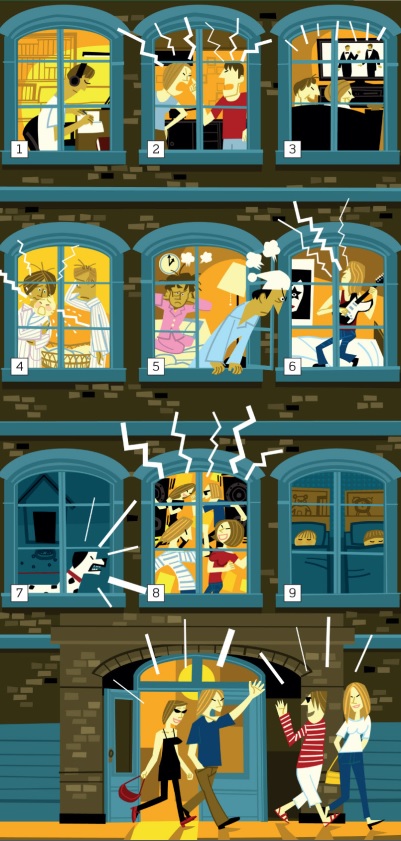
 + -ing
+ -ing













